My Top 11-2 Favourite Games of 2024!
Rhianne Ward
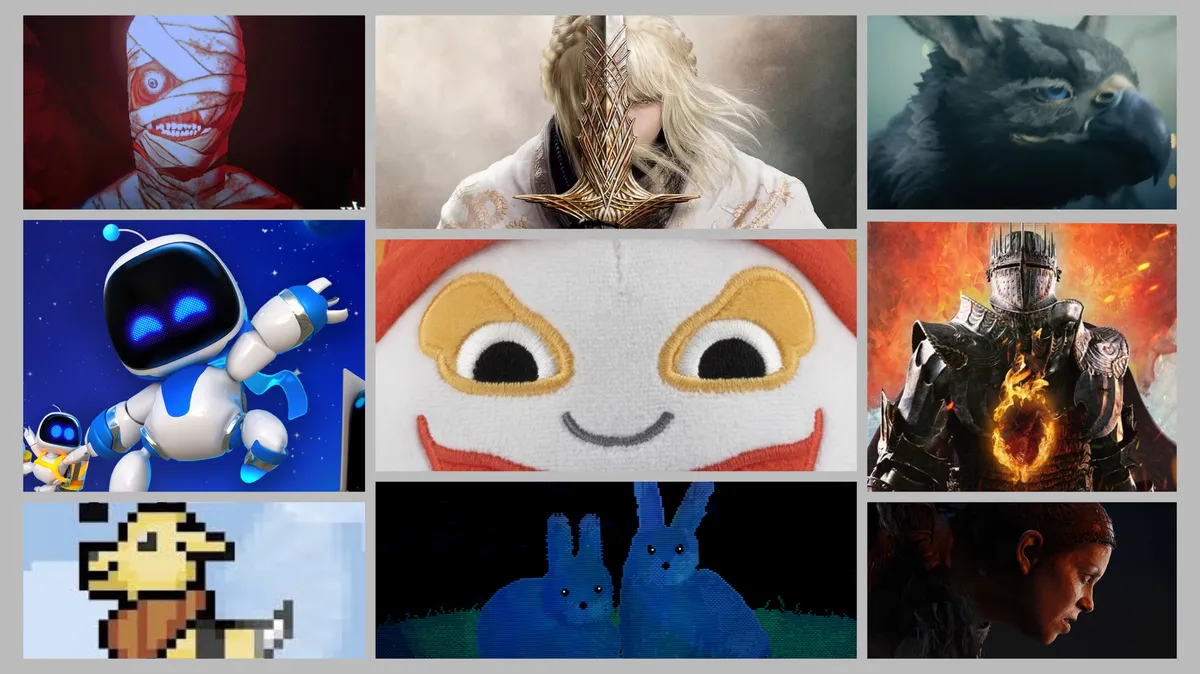
Hello, and welcome to the second instalment in my Game Of The Year roundup! I realise this has come a little more than a “few days” later than anticipated. That was due to a few IRL complications and a general underestimation of the scale of this project. I literally do this every year, and yet I always forget! I tried to keep it modest, but eventually I had to accept that I just love video games too much, so boom! 9000 words, for you!!
I hope you enjoy reading. It's a long one of course, so I wouldn't blame you for skimming, but I'm happy with it nonetheless. Here are the silver medallists; my top 11-2 games of 2024! My official Game Of The Year will have its own dedicated post, so look out for that. Not promising a time frame for that, however. I've learned my lesson! Anyways, enjoy :)
Animal Well
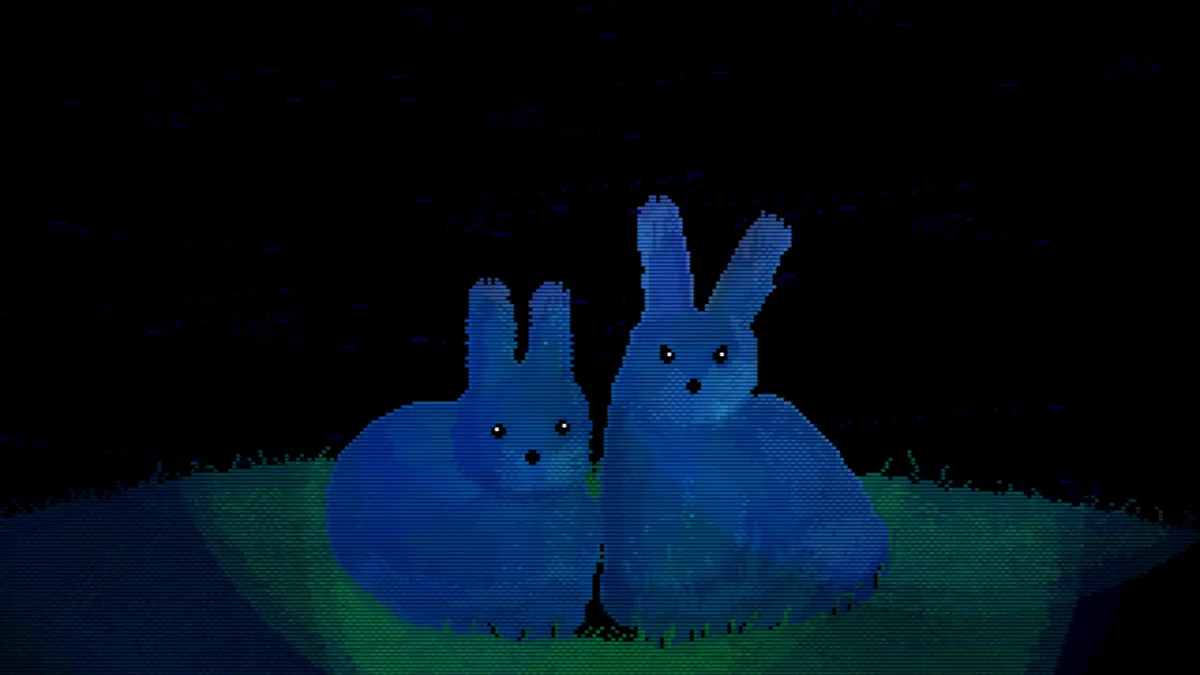
There's a lot of value to be found in games that refine their formulas. The entire process of making art is all about taking bits and pieces from works that inspire you, and transforming that into your own cool thing. No art is truly original - truthfully, we're all just ripping each other off - but a unique combination of ideas can result in something very special.
As such, when you get a game like Animal Well, you hold it tight. Unique is definitely the operative word here. On a surface level, Animal Well isn't anything particularly special. It's a metroidvania in the most traditional sense; you explore an open world which often loops back around on itself, and that world is broadened with the introduction of various abilities you can find on your journey, allowing the player to open up new paths and uncover secrets. It's an evergreen design ethos dating back to the first Metroid, and now the genre dominates the indie scene. This is all to say Animal Well would have to do something special - bring something new to the table - in order to stand out. However, that's the fascinating thing: it doesn't!
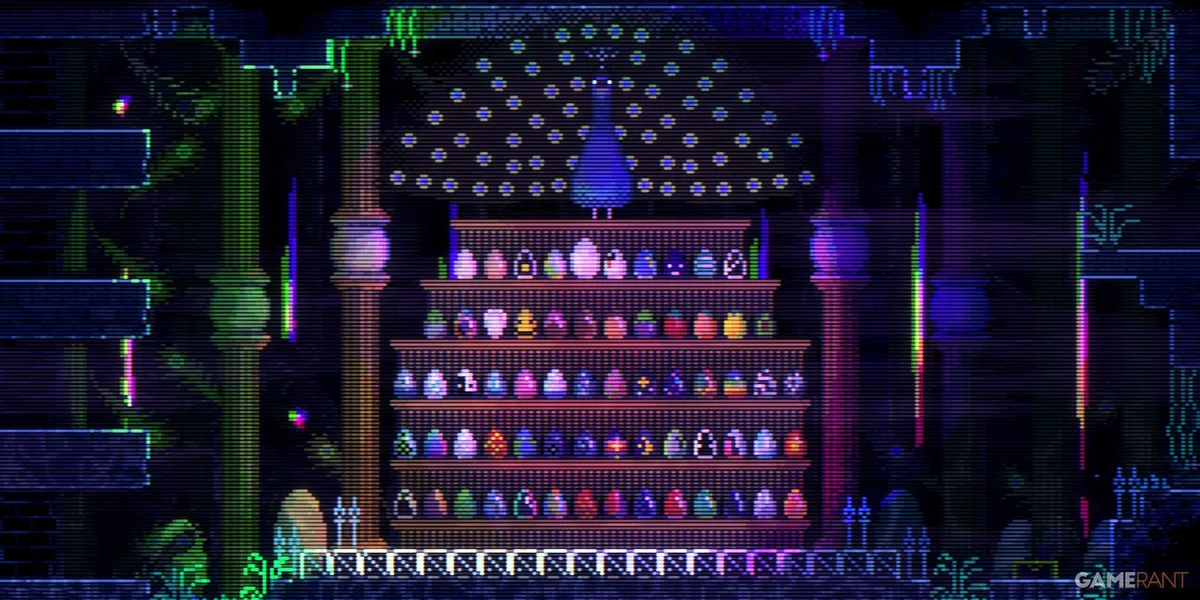
The strength of Animal Well lies in its restraint. The game opens wordlessly. You're a little blob in a dank cave and you're expected to find your own way through the world. There's no combat in Animal Well - just traversal and puzzle solving - but there is still danger, so you want to watch your step whenever you can. The world itself is actually quite intimidating; like I said you're just a little guy, while everything else is enormous and, 9 times out of 10, out to kill you. You need to be careful, and use every tool at your disposal to survive.
The way I describe it, Animal Well sounds pretty simple…maybe even generic. Combat is so often a core element of metroidvanias, so removing that feels like the loss of a limb in some ways. And yet, in stripping itself back and focusing its efforts on a few crucial elements, the game shines like nothing else I played this year. It's a stop-and-smell-the-roses type of game, encouraging you to pay attention and appreciate the haunting beauty of the world. In some ways, it's a very relaxing experience, despite the perpetual danger you're in. It feels good to sit back, soak in the experience, and let myself get lost in its web of caves and corridors.
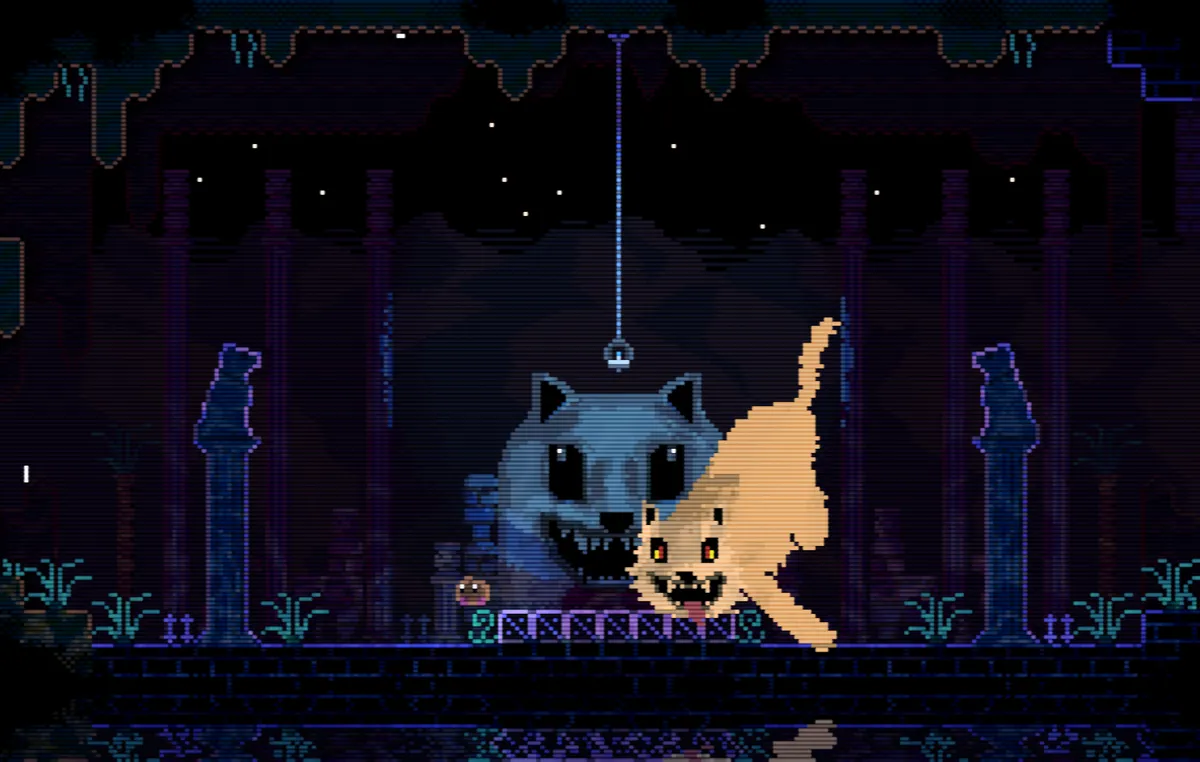
I think I really needed a game like that this year. Between work and maintaining a social life, I sometimes forget to slow down and enjoy the silence. Animal Well is just so video games, down to the core. It doesn't insist on being anything more than that, and I appreciate it a whole lot.
Astro Bot
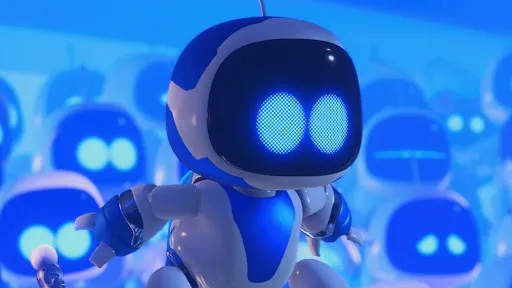
IN COMES ASTRO BOT WITH THE STEEL CHAIR!!!
I broke my own rules again. I am sorry; if this is too much of a blow to my credibility as a gamer, I will accept that. The thing is, I had started playing Astro Bot a little before I started writing the first GOTY post, and I made my peace with the reality that it would most likely not make the cut. I started playing it while I was off work with the cold, and a lot of my suspicions were (I thought) founded. It was a really fun game, but also not a terribly nuanced one. I understood it as an incredibly creative technical marvel, but I struggled to see anything beyond that. I went home for Christmas, finished the GOTY blog, and thought nothing of it.
I came back home to an absolutely shite work rota. I was slotted in for seven shifts in a row, three of which were 12 hours long. I was miserable, going from day to day without much time to rest. I had to spend New Year's at work on a sleepover shift. Let me tell you, it's a bit of a bummer to hear about everyone else getting drunk and having fun, celebrating this annual turn of the page, and I was alone, in the dark of a bedroom that wasn't even my own. It's part of the reason this middle part of my 2024 rundown has been so delayed. I finally reached the end of my labours greeted by a beautiful weekend off to do absolutely nothing, and what was waiting for me? Astro Bot.
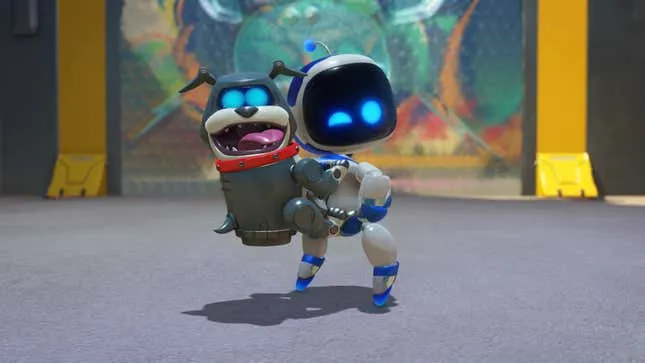
I fell head over heels. I started to see the appeal of the whole operation - just back-to-back-to-back-to-back uncomplicated, straightforward fun. There is not a single moment in Astro Bot that felt like a drag or a waste. I never encountered the thought, ‘I'll just muscle through this part so I can get back to the good stuff’ because it is ALL GOOD STUFF. I genuinely cannot believe that I played this game for 17 hours in total, because I've played games for a quarter of that time that felt twice as long. I'm just astonished by this game.
A big motivating factor for giving it a try despite not typically going for platformers was hearing from the team behind it, most notably the director of the game Nicolas Doucet. His enthusiasm for not just his own game but all games from every corner of the world is so infectious, and that passion for the medium bleeds into every crack of Astro Bot. It's a bit of a writing copout to say this, but you truly can feel the love and enthusiasm that went into this game just by playing it. This extends to the onslaught of references to other Playstation properties throughout the experience. That was another ick for me initially; the whole marketing push of there being 150 characters to discover from all across video game history. On the one hand, I'm not above enjoying a little soyfacing now and again. Hwoeverz it's hard to deny that the whole thing feels a bit lame. “Hey”, Sony is saying, “look at all these IPs we've managed to hoard over decades of corporate consolidation and monopolising tactics! Eat your slop, pig!”
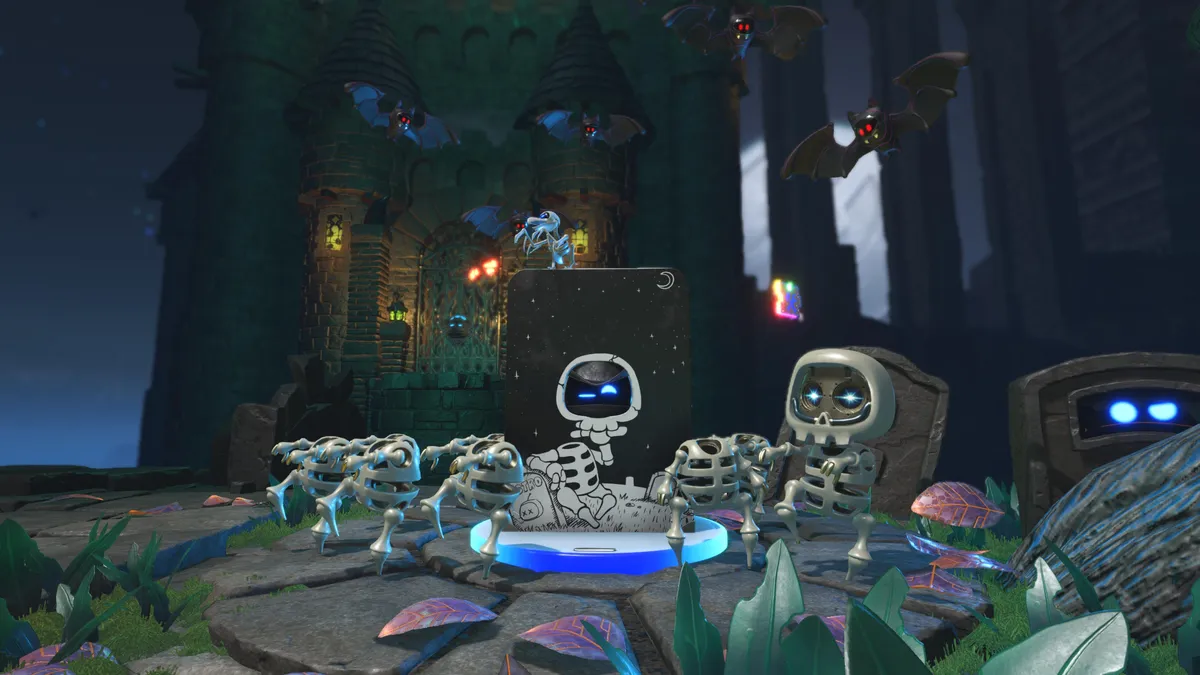
And yet, in the hands of Team Asobi, the inclusion feels, against all odds, like the honest love letter to the games industry it was claimed to be. Every unique character has their own accessory to unlock, which reveals a bespoke animation for all of them. When you find them in the game levels, their discovery is accompanied by a silly pun that often ends up being a deep cut reference to something really specific that only a fan of that character could possibly know. I'm sure there was certain properties that were obligatory - God of War, Horizon and Uncharted are PlayStation's obvious heavy hitters - but then you get the kid from Boku no Natsuyasumi, or the wee dog from Tokyo Jungle. Who the fuck is gonna know those ones except from niche weirdos like me? The game even has dedicated levels for Ape Escape and Locoroco, properties that are functionally dead in the eyes of Sony. They aren't there to try and sell more copies of the current popular thing; those are honest to God loving tributes to a couple of PlayStation classics that deserved better. I've no doubt in my mind that Asobi had to fight for those inclusions.
Beyond that adoration of games, there is also a reverence shown for the people who make them. The end credits sequence stands out as a perfect encapsulation of that game; it has you complete one last platforming level, except this time it's a power-up medley where you blast your way through the names of every person who worked on the game. The platforms are old PS1 memory cards with names on them, some of them nicknames so they would fit on the card, which was a cute touch. The whole thing feels like one final explosive, self-loving tribute, a well-deserved pat on the back for creating such a wonderful experience.
In this current era of mass layoffs and ballooning budgets, executives would like nothing more than for their creatives to become nothing more than a forgotten footnote on an otherwise disposable product. Astro Bot is a refutation of that mentality, and a reminder that people make games, and they deserve their flowers for all their hard work and passion.
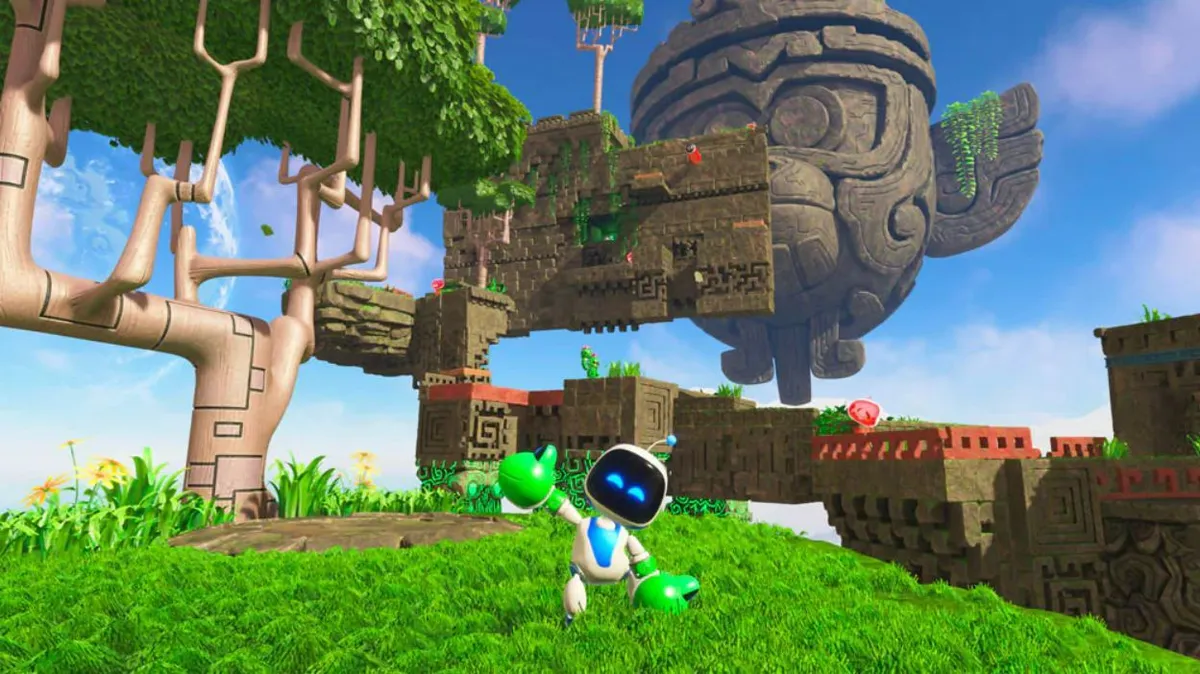
In that sense, in all its constant reaching through the screen into our world, between its references, usage of real life PlayStation iconography, or just Astro happily waving at the camera on occasion, the line between this game's world and our own is basically non-existent. As such, I think it's beautiful that Team Asobi used that format to recognise the most important real-life connection of all: the people who brought the game to life in the first place. For what could have so easily just been a soulless advertising scheme for the PlayStation brand, that's pretty wonderful to see.
Atlas Wept
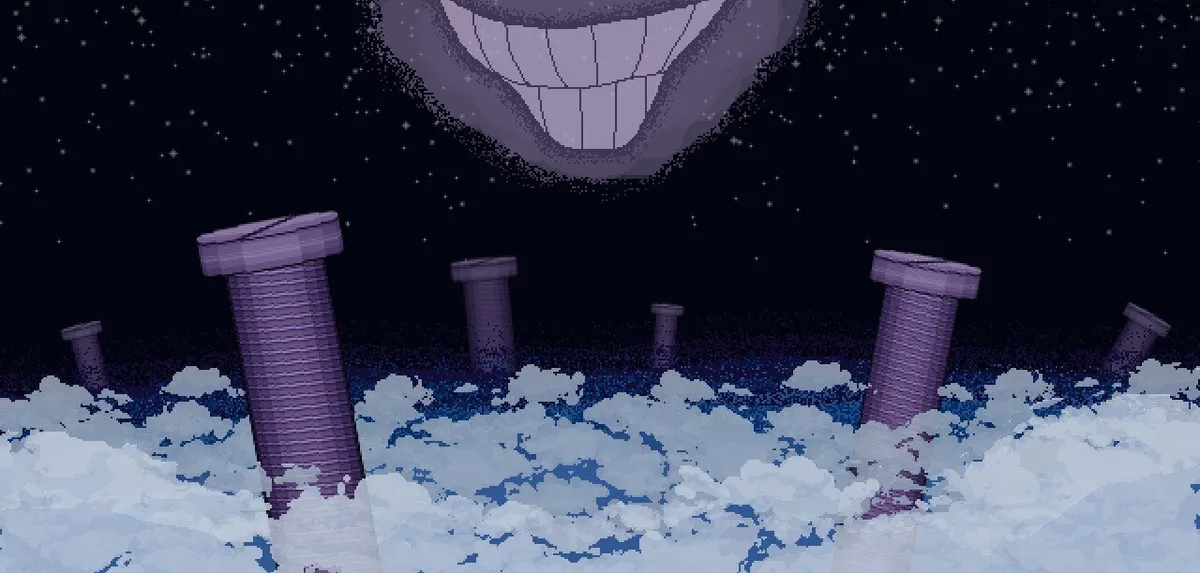
There's not an awful lot more I can say about Atlas Wept that I haven't already stated in multiple other posts. I guess I'll talk about the reason I even played it in the first place. I bought a Steam Deck at the start of the year, and that was by far one of the best decisions I made in the last 366 days. I was obsessively scanning the Steam store, looking for any and all weird little obscurities to sink my teeth into. I stumbled upon this tiny game called Atlas Wept, and looking at the artstyle and the description, I found it kinda compelling. It came out and had a pretty cheap entry fee so I figured, why not, I can fit this in with the handful of mid-2010s blockbuster games I was cycling through at the time. I booted it up expecting to give it an honest try and bounce off. Instead, I fell in. Waaaaaaaaay in.
Atlas Wept is that special kind of game that feels so whole. You don't experience that right away; the story takes a little time to set its groundwork, and the gameplay is a pretty familiar blend of different RPG mechanics. Even aesthetically, it reads like a straightforward RPGMaker game, until little cracks start to form. You hear about how the town you start in is surrounded by a force field that repels missile attacks, but that statement is treated with such matter-of-factness that it's a little jarring. What do you mean the world is at war, and why is everyone so okay with that? It gets the imagination racing as to what on Earth is going on, if it even is Earth to begin with. Then the game switches to an entirely different perspective in what seems to be a completely different setting, and you start to wonder how this is all supposed to fit together and then it DOES, but before that happens, the lead-up is so compelling, and I found myself glued to my deck from start to end.
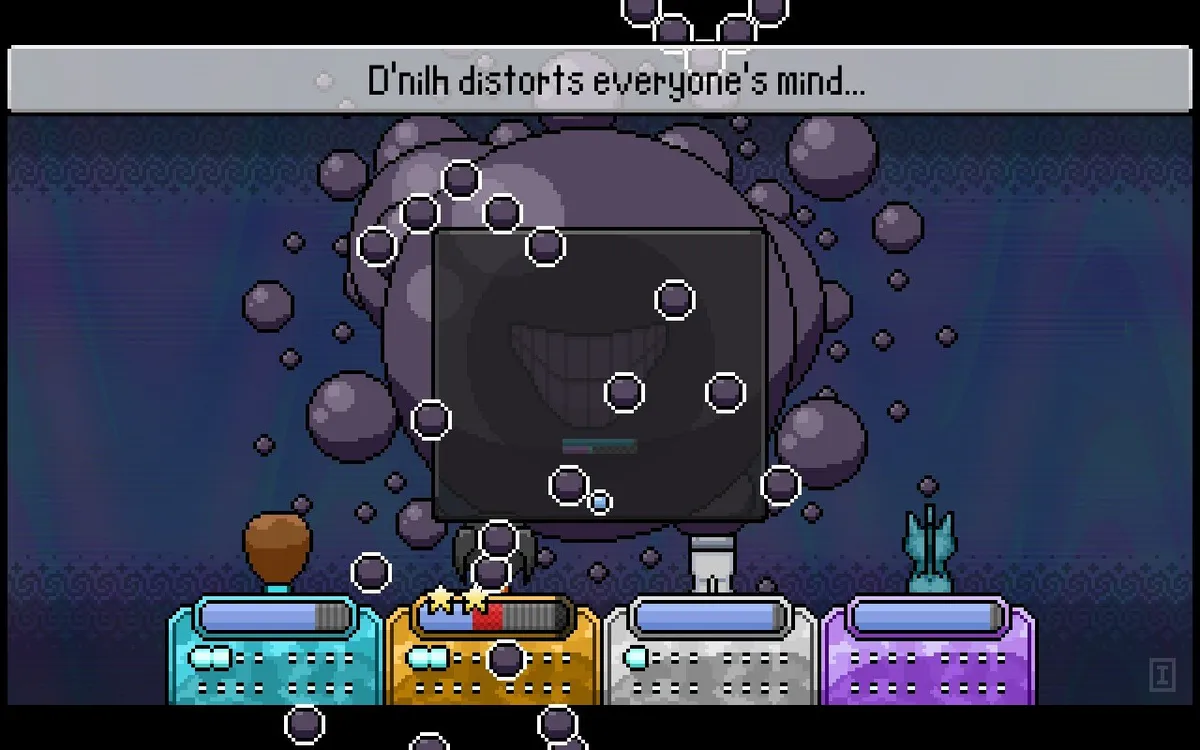
The story goes in such interesting directions, discussing heady themes like identity, rebellion, and our place in the universe. It presents a situation so utterly, apocalyptically hopeless, and asks if there is still a point in fighting, even if you know you are doomed. It's classic JRPG fare, but what sets Atlas Wept apart is its very explicit inclusion of LGBTQ+ characters, including a fully out trans girl. Where other stories might state the importance of continuing to try even when everything seems over as a self-evident good, Atlas Wept does the obvious thing, at least to me, and ties that world-ending feeling to the experience of being queer. By doing so, Atlas Wept introduces its own commentary on why queer people often love these kinds of stories, and what it says about the LGBTQ+ experience in our modern world. As a trans woman often caught in my own spiral of self-doubt, that's what I certainly connected to, at least.
Art is wonderful because it makes manifest experiences we may not always have the words for. It's an avenue for self-expression first and foremost, but inevitably, there is a communal quality to it; the magic of completely separate individuals coming together over a passion for this one idea. That's what I like to think this blog serves as. It's for me, of course, but I like to think that my writing helps some people see certain video games in a different light, or maybe discover brand new ones that compel them. I'm under no illusions; this is a really small blog, and my impact on the medium of games writing is incalculably small.
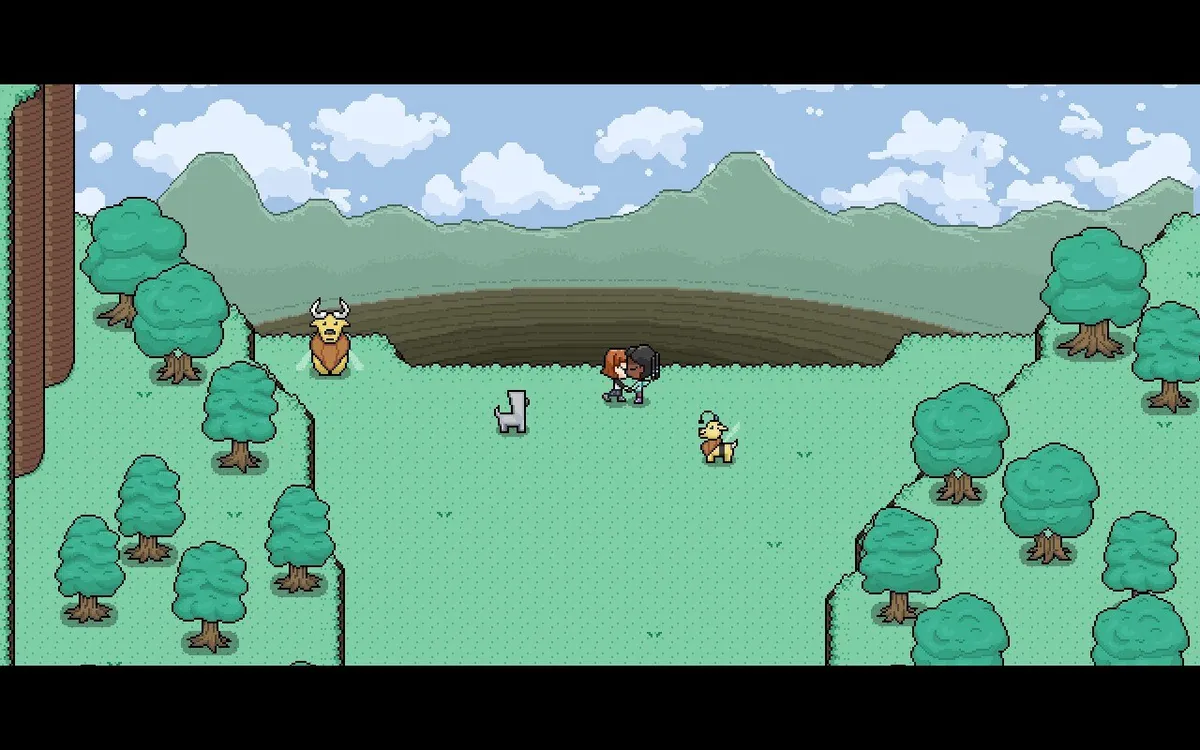
But then a game like Atlas Wept comes along and reminds me that every word I commit to screen affects the world in even the tiniest way, and those little actions mean I exist, even if it seems pointless in the moment. Atlas Wept is like this too, in a sense; a relative unknown that not a lot of people played, but I did, and it had a really strong positive effect on me. I'm happy to keep writing, to keep being a visible and vocal trans woman, because my existence matters, and it does affect the world, even in small ways. Atlas Wept is really good. I hope the solo developer Robbie Charlotte Lee keeps making games. I hope she knows her work matters, to me and to everything.
Balatro

To go from my deeply personal, profound experience playing Atlas Wept to fucking Balatro is insane, but we've got to ride that absurdity wave all the way to the shore so LETS GOOOOOOOOO. Balatro absolutely fucking rips.
I was once a doubter, and perhaps you are one such case right now. I spent the whole year hearing about this fuckass poker roguelite, and I refused to believe that a game so simple, so seemingly devoid of personality, could actually be that good. Then it got nominated for Game Of The Year at the Game Awards, and that basically sealed the deal. I had to try this thing, and understand it. I was so ready to bounce off after maybe an hour of trying to figure out the rules, failing, then moving on with my life.
But I did not move on. In fact, I'm still in it. Balatro has become a genuine part of my everyday life. I play it whenever I need to relax after a long day of work, I play it when I can't sleep and need a distraction, I play it when I'm on the train or a long bus ride when I could be writing this blog post I've been putting off for days! I am so deep in this particular pot of sauce, and it is arguably ruining my life. I have so many games I could be playing - horizons I could be expanding - and yet here I stand, amongst the cards, losing almost always, winning sometimes, and loving every second of it.
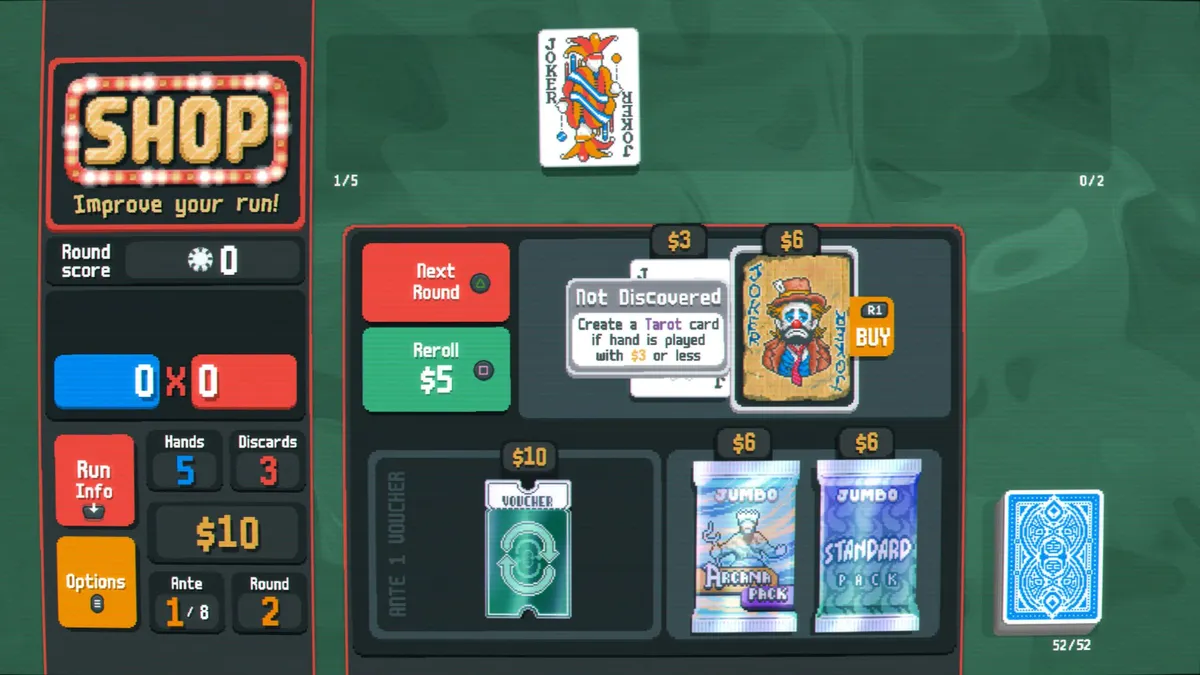
I was definitely wrong about one thing: Balatro is not simple. It's minimalist, for sure, but to call it simple would be ignoring the levels of insanity that reliably unfold if you play your cards (ha) juuuuuuuuust right. It is functionally operating on the same rules as poker, but rather than trying to beat an opponent, you are given points for your various played hands. A straight scores less than a flush, but make it a straight flush and you're in the fuckin’ money, baby! Figuratively speaking, of course; Balatro’s developer has committed to never monetising the game beyond the initial asking price of around £12, which is just really cool to see!
Anyway, acquiring different modifying cards - Jokers, Planets, Arcana, etc - results in your score increasing, and it's in the combination of all these factors that truly uniquely builds can blossom. The cliché with roguelites is to claim “no two runs are the same”, which is often true mechanically but less so experientially, but in Balatro’s case, I have truly never been bored or felt like I was running the same routine over and over again. The game finds this beautiful balance between reaction and strategy, between forethought and pure luck, that is so difficult to pull off in most roguelites. Indeed, many of them fail in this regard, but not Balatro. I'm sure there is an optimal way to play this game that guarantees wins, but in my experience, it is most fun to go with the flow and let whatever cards you initially pull dictate the tone of your run. It doesn't always work out - for me, it often doesn't - but the way I can just rely on the game to deliver something fresh every single time, no matter what, is astonishing.
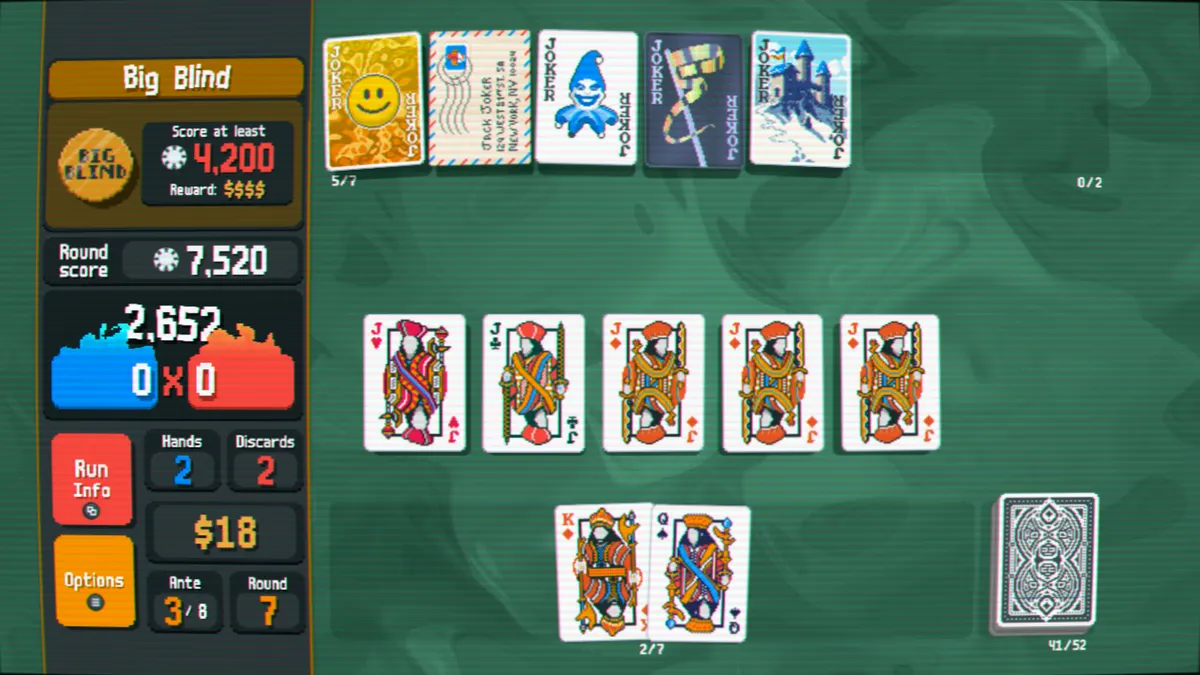
I truly don't know what else I can say about Balatro. It truly is that good, but it needs to be played to be believed. I appreciate it as an avenue into a gambling addiction minus the debilitating financial devastation that would ordinarily wreak upon me and my kin. For such a straightforward game, it is deeply sophisticated in its execution. It looks cool, it sounds cool, it feels cool, and I am so far from being done with it. Even when the dust settles and I have mastered every deck, unlocking every card, there will always be a place in my soul for this game. From Balatro I was born, and to Balatro I must return.
Dragon Age: The Veilguard
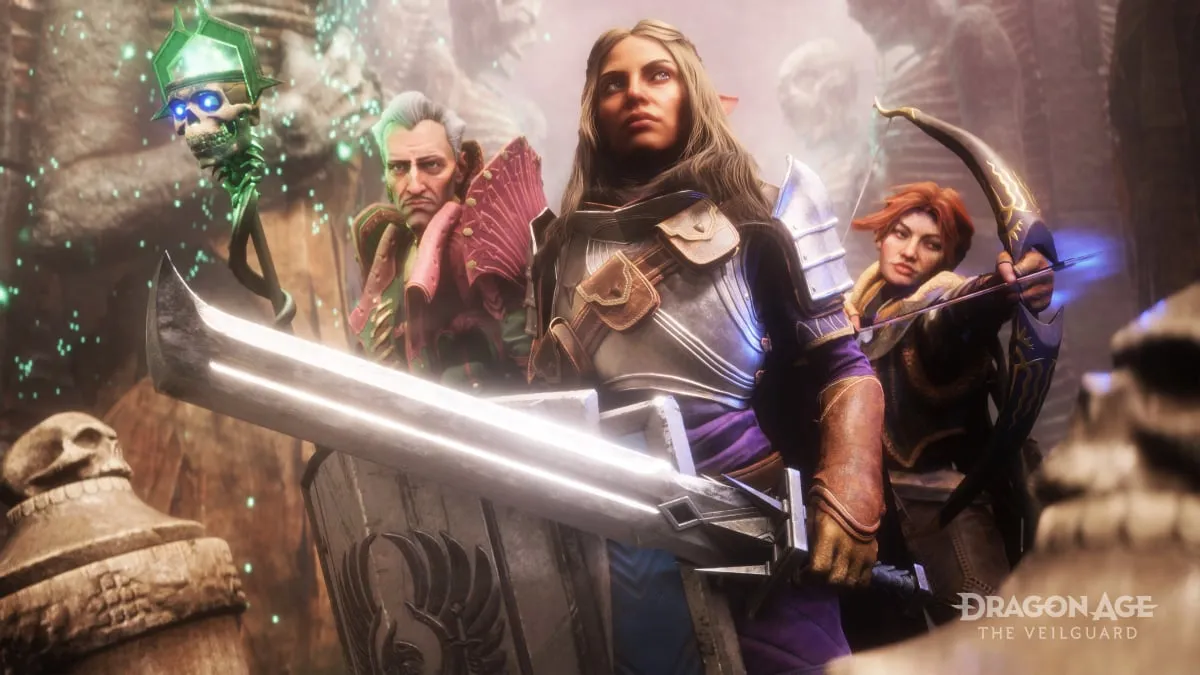
2022 was a year of huge changes for me. I moved to Glasgow, I got hired for a new job, and, most importantly of all, I became a big time Dragon Age fan. Big shout-out to my good friend who I stayed with for a few months while I was figuring my shit out, who strategically utilised the fact that I could not escape to get me to finally play Dragon Age Origins. Love you lots, even if the Deep Roads and the Fade feel like cruel and unusual punishment targeted at me specifically. Regardless, Origins slapped, Dragon Age 2 became one of my favourite games ever, and Inquisition left me yearning for more. That last one was the cruellest torture of all, but at least I didn't have to wait a decade like some did.
I did know that a Dragon Age 4 was in development, so once I was caught up with the series, I made regular pilgrimages to the various teaser trailers made available. I was so desperate for more, and BioWare very kindly answered that call with a surprise release date trailer (the one a lot of Gamers™ did not get on with, if you're curious). I thought it was really cool, though! I liked the tone it set, and the visuals were obviously a bit of a departure for the series but I still found the chosen aesthetic quite striking. Beyond that, however, it was one crucial thing: more Dragon Age, finally! Naturally, I was seated on day one, ready for whatever the developers decided to cook up. Expectations were quite high, and thankfully Veilguard handily met them.
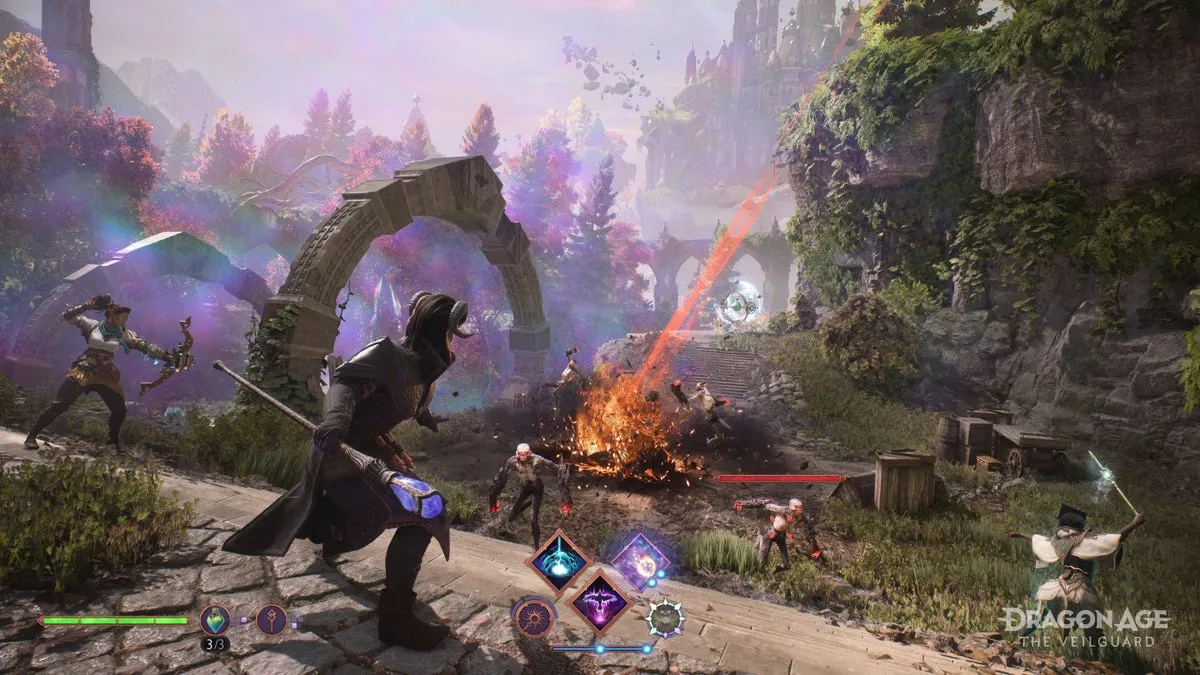
It's not perfect, of course, but I appreciate that BioWare were clearly shooting for something here. The faction system is a little undercooked, but I like the feeling of collaboration it evokes. The writing can feel a little sanitised at times, but at others it delivers some of the most gut-wrenching beats I've experienced in any piece of fiction this year. It also helps that the game is drawing from some of the richest fantasy worldbuilding ever put to disc. It feels very cliché to say, but as is the case with basically every BioWare game, for every miss, there's a hit so dead centre on the target that it shatters the board. The simple truth is that I love Dragon Age: The Veilguard, in ways that words will likely fail to describe. I am disappointed by aspects of it, but at the same time, it is everything I wanted it to be and more.
There's also a real-life component to my love for Veilguard. Like I said earlier, my true entry point into the series was through my friends who had been bugging me to play it for years, and by the time Veilguard dropped, I had become that friend to the other people in my life. This game coming out might not have been some world-shattering event, but it definitely felt like it to me and my friends. It reminded me of the early days of Elden Ring, where we were all trading stories and sharing hints, careful not to spoil anything but desperate to help each other find the cool stuff. It was really awesome, and for my friends and I, that was Veilguard; meeting up to hang out, and saying some shit like “did you get to…the thing, with the guy?” and just instantly knowing what that meant. I was actually the last one of my friends to finish the game, which made for what I'm sure was a very cathartic experience for my buddies when I was going catatonic when…well…the thing happened to the guys.
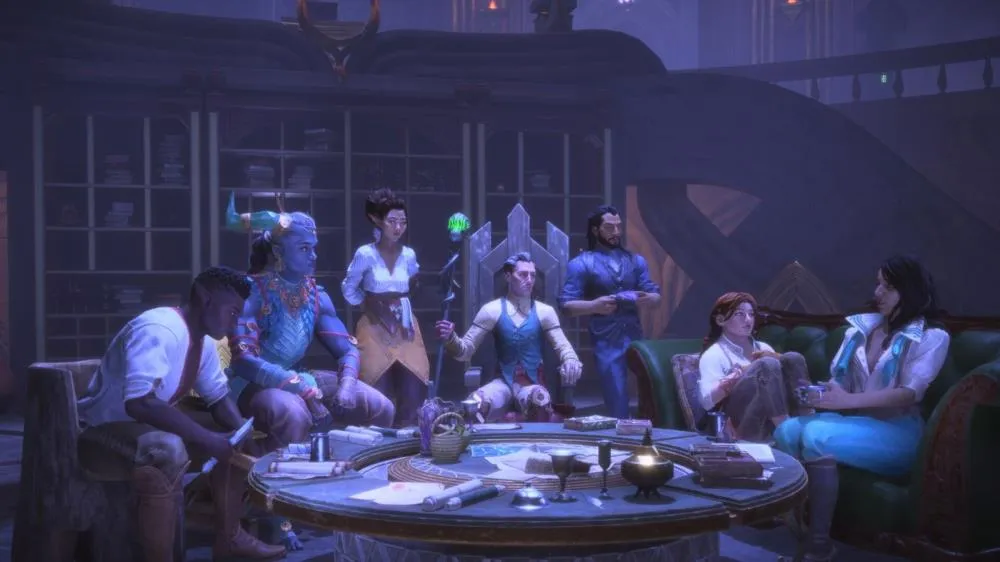
So yeah, I'll admit that I'm taking my “““objective game critic””” hat off for Veilguard, because to detach it from its out-of-game importance to me would be a little inauthentic of me. However, knowing this, I still think Veilguard is a really great game. Like I said, when it is at its best, it is genuinely spectacular. Character deaths aren't a new feature of Dragon Age, but I think Veilguard has easily the most impactful one, and the way it ties into its narrative thread about leadership and having to make difficult choices and live with the consequences was incredibly effective. Do I wish the game as a whole had more of these hard choices? Sure, but I wonder if that would have weakened the ending’s emotional gut punch. It's hard to say for sure, but what is easy to say right now is this: I love Dragon Age: The Veilguard.
Dragon's Dogma 2
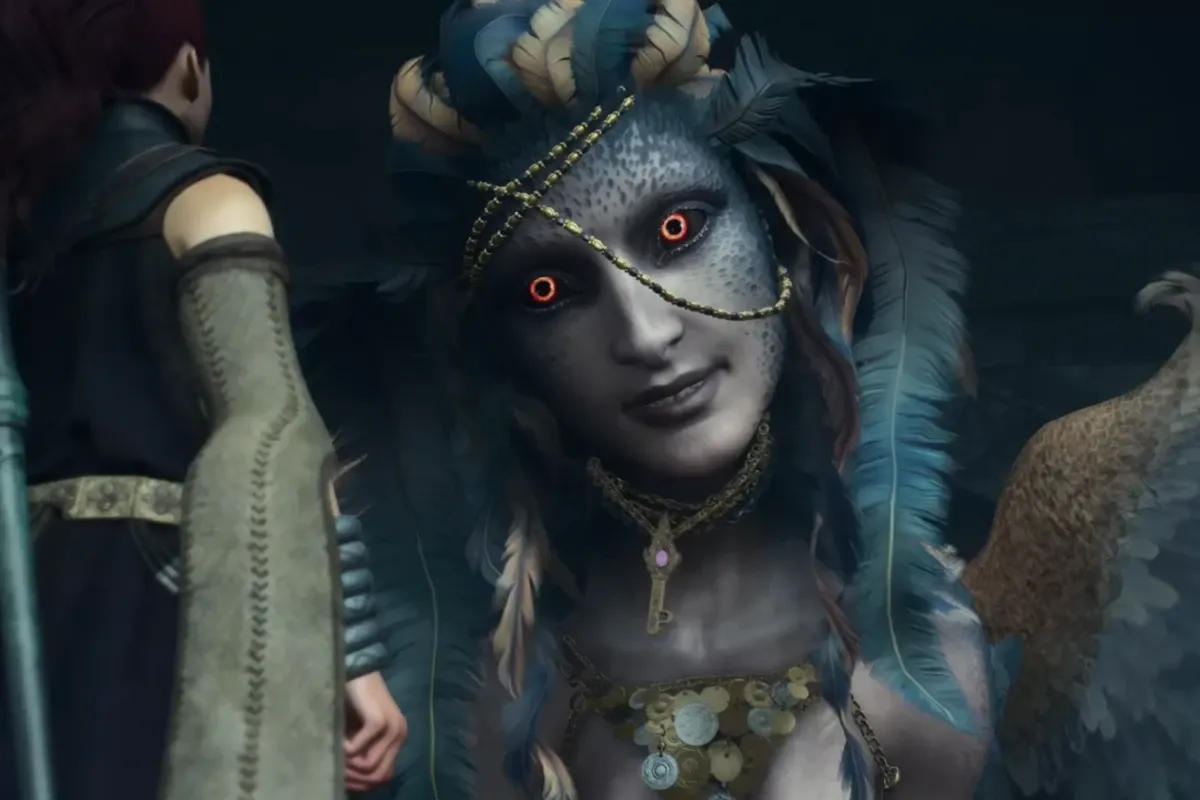
In order to talk about Dragon's Dogma 2, I first need to talk about another game, similar on paper: Final Fantasy VII Rebirth. Anyone who read my post “The Games I'm Most Excited About in 2024” (which, according to my statistics, is exactly two people lmao) then you'll understand how excited I was for Rebirth.
FFVII Remake was, and still is, one of my favourite games ever. It is such a phenomenal experience, capturing its city setting and the characters who populate it beautifully. It's as funny as it is devastating, and I was completely enraptured by it from start to finish. Then when I finished the game and started listening to opinions from people who had actually played the original as well, I gained an even greater appreciation for it as a metanarrative on remakes in general. In a game all about a group of rebels trying to liberate themselves from the iron grip of their oppressors, to have them simultaneously fight to free themselves from the literal architects of the original narrative, whose job it is to maintain that timeline of events, is a level of madness I expect from only the best JRPGs. It's just an unbelievably cool and wildly ambitious experience from start to finish, and replaying it at the start of the year only reminded me of that fact.
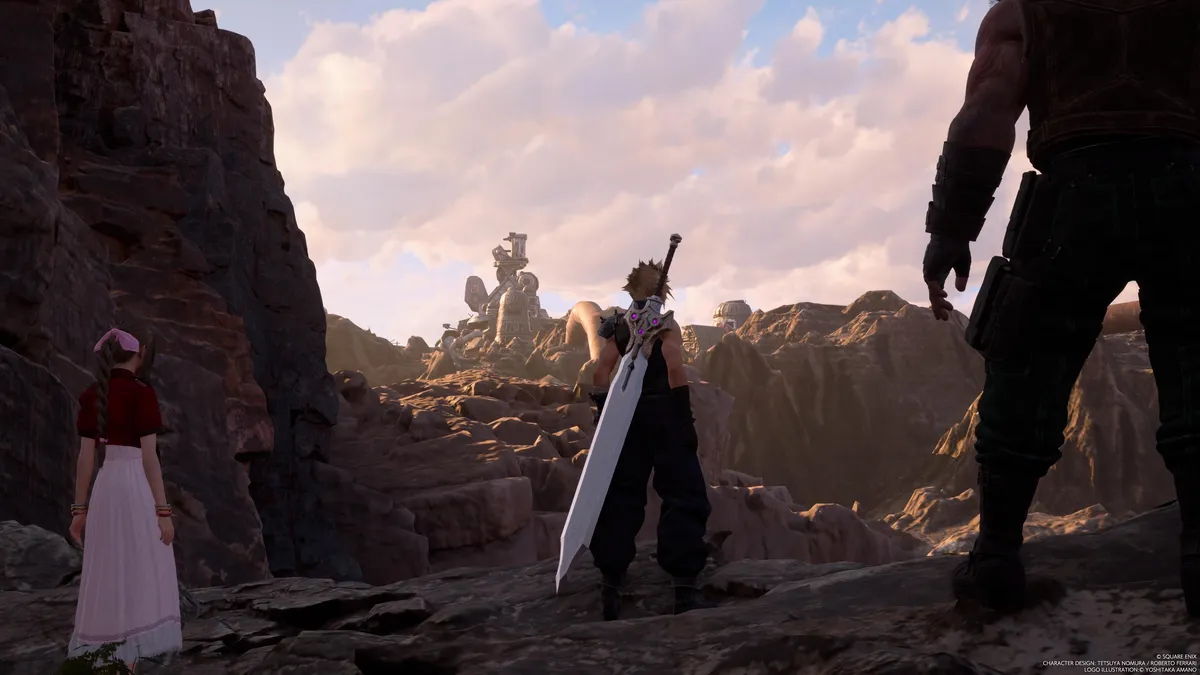
So naturally, I was extremely excited for Rebirth, the continuation of that incredible story. It arrived at the end of February and it was…a very mixed bag. On the one hand, that irreverent charm was maintained here, perhaps to an even greater level. Returning characters are just as memorable here as ever, and the newly introduced cast are a treat to behold. The game is also consistently gorgeous and with its constantly changing locales, it was easy to fall in love. And yet, I didn't, and a big part of that was down to its world design. Objectives in Rebirth operate like a checklist, constantly ferrying you from one task to the next, the paths very carefully designed so you'll never get lost. There's no danger of making mistakes or wasting time, because it's all just there in front of you, ready to be enjoyed. This should make sense, right? The idea of buying a game is you get to play it. However, in practice, the game feels so unbelievably bland. The whole experience just washed over me; I rarely got to stop and smell the flowers, because there was never any reason to. All this carefully crafted beauty and splendour, only to have my eyes affixed to the compass at the top of the screen.
By mid-March, I had reached the Cosmo Canyon - around two thirds of the way into the game - and presented with yet another checklist of inane bullshit to complete, I gave up. Maybe I'll finish Rebirth someday, but by this point, I was beyond caring. That's when Dragon's Dogma 2 reared its head. I was slightly dreading it; another open-world RPG, so soon after being spiritually crushed by a different one, truly did not spark joy in my heart. However, my flatmate was adamant that Dragon's Dogma was incredible, and the sequel looked to be just as fantastic, so I figured “hey, what's the harm?”. Little did I know, I was about to play a game that was everything I needed it to be, right when I needed it most.
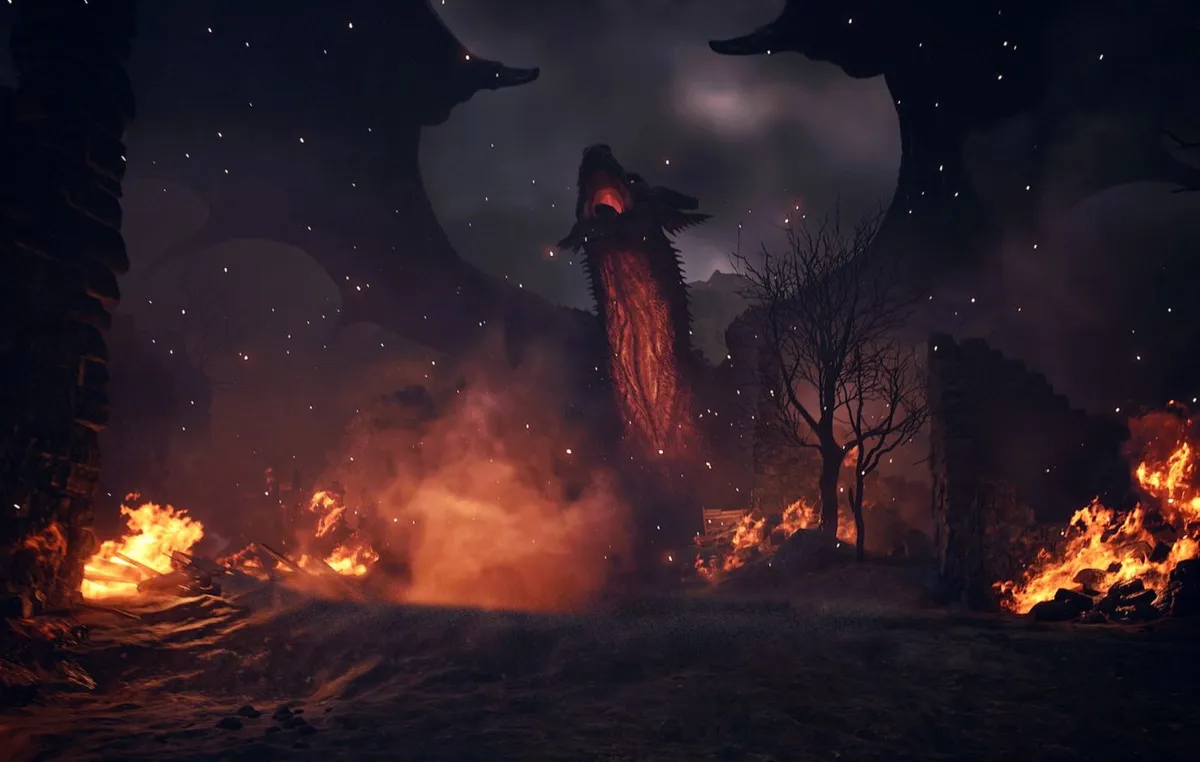
Dragon's Dogma 2 is an astonishingly good game, and a lot of that comes down to its emphasis on encouraging player curiosity. Looking at a screenshot of the game, you might not see the genius at play, but it's all there in motion. There is a minimap present, like almost every other open world game, but the info it gives is limited, and if you're in a new area, it's mostly blacked out, only showing the alight outline of potential routes to take. This means you actually have to look at your surroundings to determine the best route to go in pursuit of your objectives. A revolutionary concept, I know! Speaking of objectives, they are there and they even have markers, but those indicators are vague at best and basically useless at worst. Once again, you have to use your actual human brain to navigate the game's challenges. What a concept!
DD2 is a game packed to the brim with secrets hidden around every corner, and it is entirely up to you to uncover them. Very rarely are you pushed in the direction of the cool shit; the only way you'll encounter some of the best quests is by following your own senses and trusting your gut. I oftentimes found myself looking at the map, seeking out places I hadn't been to, and just going there. More times than not, there was something cool to uncover; not necessarily a quest or a combat encounter, but sometimes just a really nice view, or a little house with some guy inside who tells you a story. It's the kind of game where you'll get a lot out of it if you go in with an open mind and some whimsy in your heart.
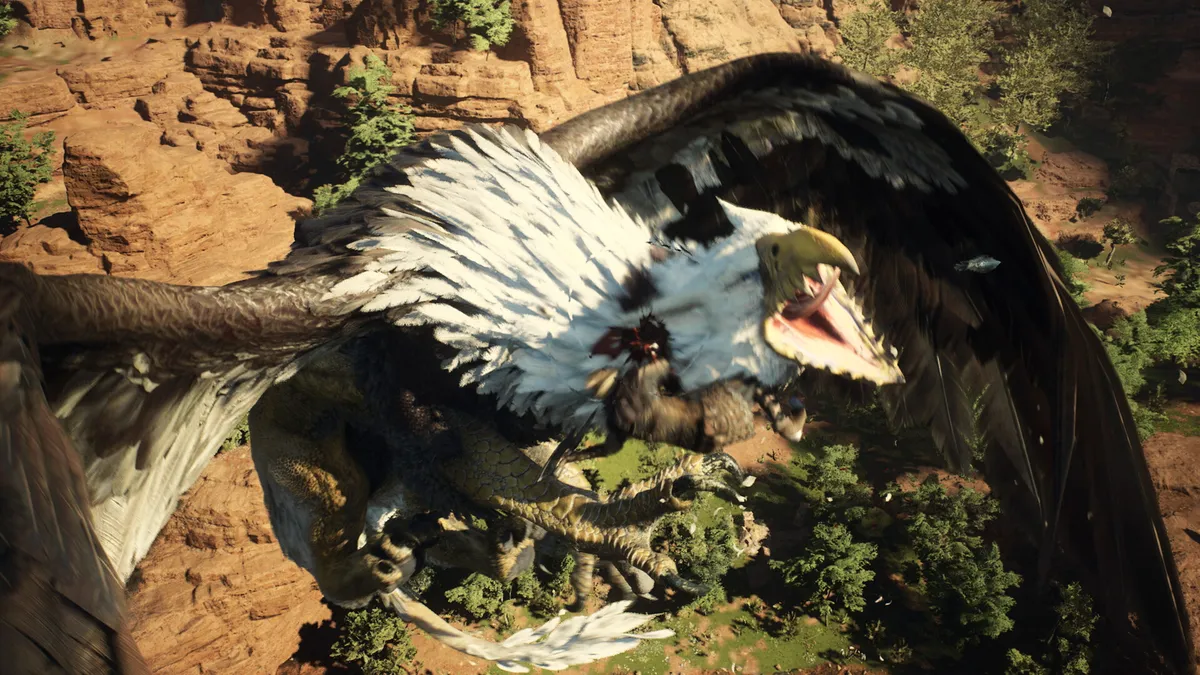
Not to mention, this game is mean and bullshit, but in a deeply compelling way that never stopped working for me. For one, the game is incredibly strict about fast travel. It requires a very limited resource that you really don't want to burn except in emergencies. Luckily, there is a taxi service of sorts: a caravan you can hop on the back of which will ferry you between important places. But watch out! Sometimes the caravan will get attacked by goblins or trolls or an ogre, and you need to defend yourself! Of course, even if you make it through that encounter, if the enemies killed the horses or the caravan driver or smashed the caravan to pieces, you better believe your ass is making the rest of the journey on foot, most likely in the dead of night when monsters are at their strongest. It's a game full of little and big friction points like this, and I absolutely adore it for that. It makes the world feel so dynamic and alive, in ways that a game like Rebirth simply cannot achieve with its strict design ethos.
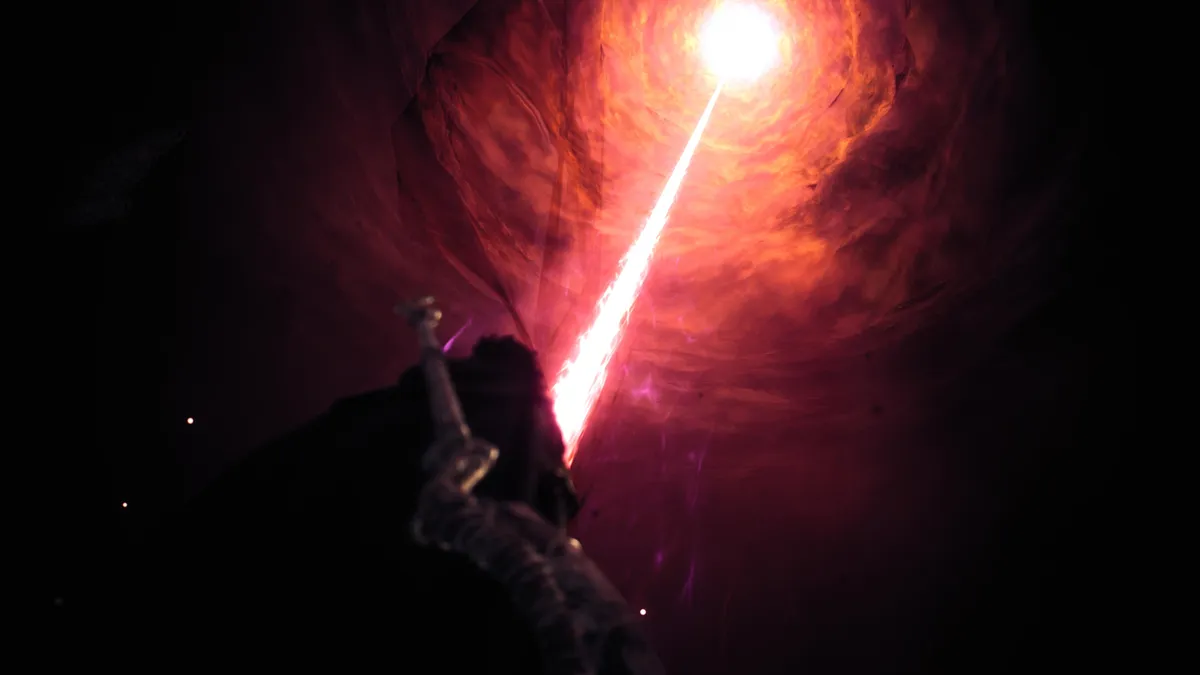
I apologise if this section comes off as a Rebirth hit-piece, rather than a Dragon's Dogma 2 appreciation sesh. The truth is, for a couple weeks at least, Rebirth cast me into a pit of despair where I was unable to enjoy games, and Dragon's Dogma 2 threw me the rescue rope. It's a strange and oftentimes cruel game that managed to do what Rebirth couldn't: it surprised me, it shocked me, and it sent me on an honest to gods adventure! If it weren't for one other game, it would have been an easy lock for my Game Of The Year. Hopefully soon, you'll find out why it didn't quite make it. Regardless, Dragon's Dogma 2 is one of the best games I've ever played, and everyone should play it. Even you!
Elden Ring: Shadow of the Erdtree
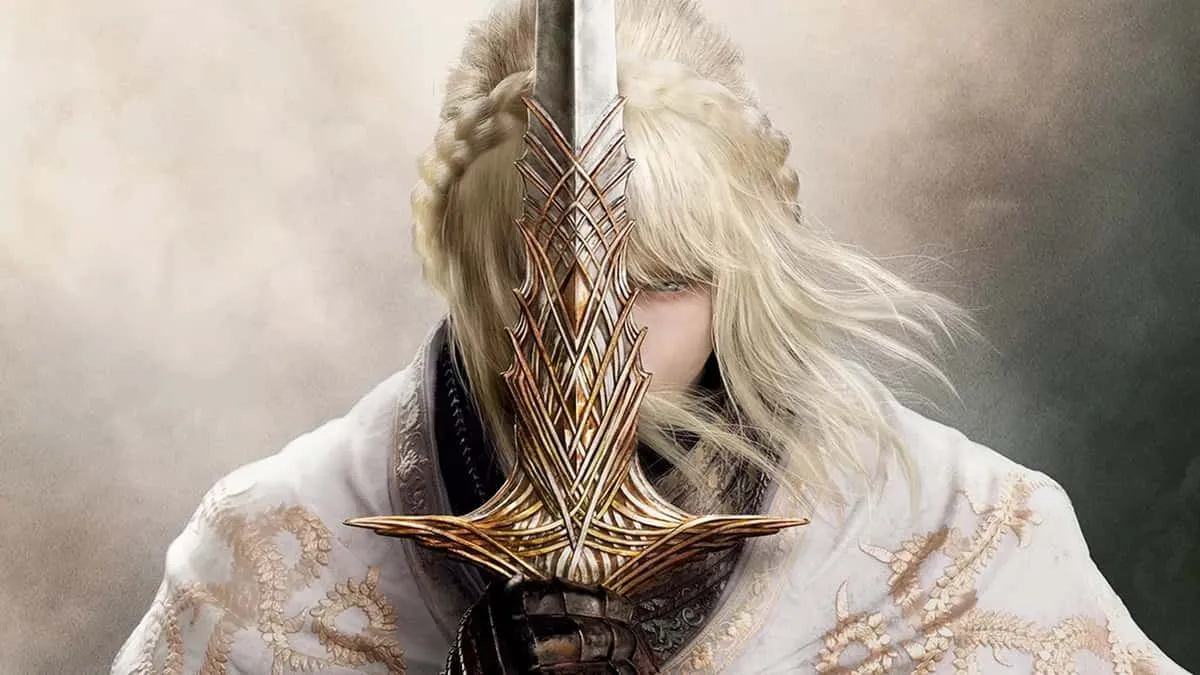
On the subject of adventures, nothing quite hits in that regard like Elden Ring. I hadn't even made it to its own section of the blog, and it still got me chatting about it earlier! That's a level of power few games can claim to wield, and yet, Elden Ring earns it. You don't need me to tell you how good it is. Elden Ring is incredible. It's a monument to the insane talent of From Software and their astonishing capacity of worldbuilding and unconventional storytelling. Not to mention, it's fun as shit. Unsurprisingly, I have invested around 300 hours into it by this point, so of course, Shadow of the Erdtree was bound to be interesting, at the very least.
Lo and behold, it was amazing! Not just amazing, but genuinely exciting in the ways it transforms the Elden Ring formula, trying out new ideas and succeeding with aplomb. On a base level, it is good because it is more Elden Ring; more of a thing that is self-evidently phenomenal. The game looks incredible, casting beautiful vistas of the eternally-waning Land of Shadow. Occupying those beautiful areas are a variety of memorable boss encounters which all challenge in unique and creative ways. I'll be the first to admit that there was many a time where I would get unbelievably tilted about how bullshit some guy was, only to come out the other side after a few tries acting like it actually wasn't that bad. Classic Soulsborne behaviour, in other words. Throw in the base game's talent for cleverly hidden secrets to discover, and you have yourself a wonderful world to explore and battle against.
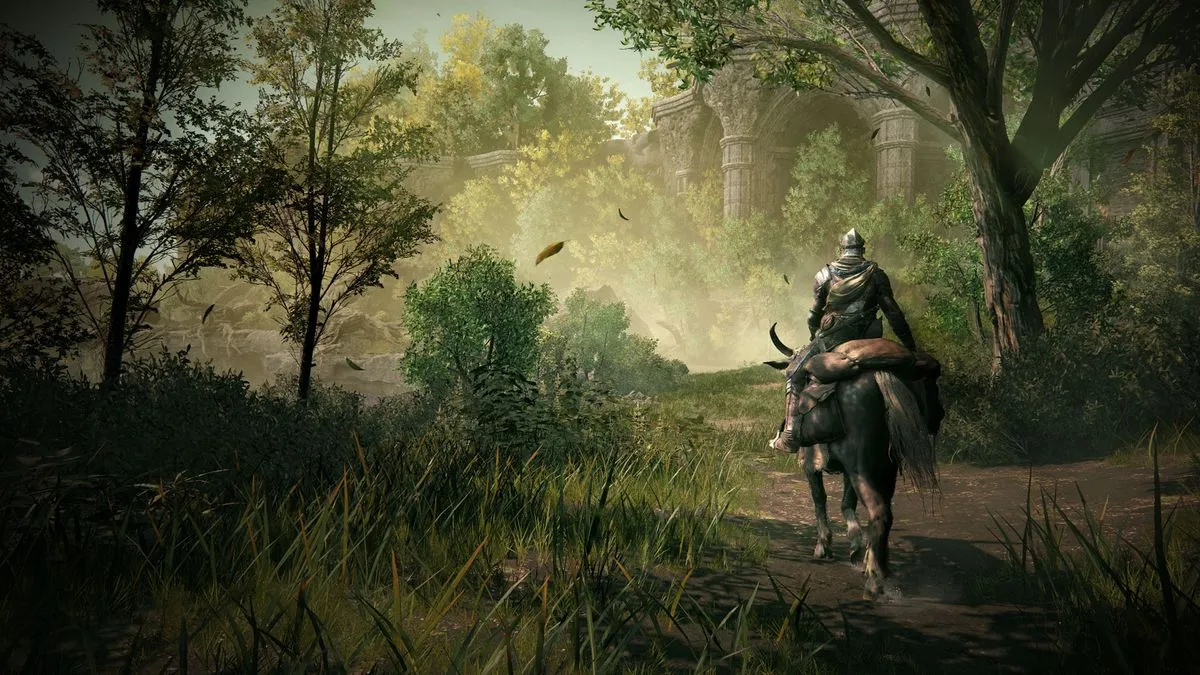
However, what ended up sticking with me in Shadow of the Erdtree was the new stuff. For example, traversal is fucking insane now. The level of verticality in this map is quite frankly taking the piss, but in the best possible way. It was so funny to look at the map right at the start, think to myself “oh this won't be so bad”, before realising that I was actually looking at what amounted to maybe half of the total navigable areas in the game. The world would open into and twist back upon itself in so many fascinating and unexpected ways. It's hard to believe that human beings are capable of crafting something this complex. We live amongst crazy people!
Although, the standout feature was the DLC’s focus on its characters. From Software games are no stranger to NPC questlines; indeed, this is where much of their games’ emotional cores, their souls, lie. Dark Souls couldn't evoke its iconic sense of hopelessness without giving you pseudo travelling companions in Solaire and Siegward, and having them both succumb to their own individual madnesses, leaving you alone in an empty world. Bloodborne’s numerous endings would not be so impactful were it not for how they relate to your relationship with Gehrman, the old wheelchair-bound hunter who gives you the tools to get you to this point. Every game from Demons’ Souls onwards has some kind of character - the Maiden in Black, the Fire Keeper, the Doll - who is a constant presence throughout your journey, aiding you and in many ways acting as a familiar source of comfort to the player through all their trials and tribulations. My point is that NPCs have always been really important to the identity of the Souls series, so an increased focus on them has always been something I'd be down for.
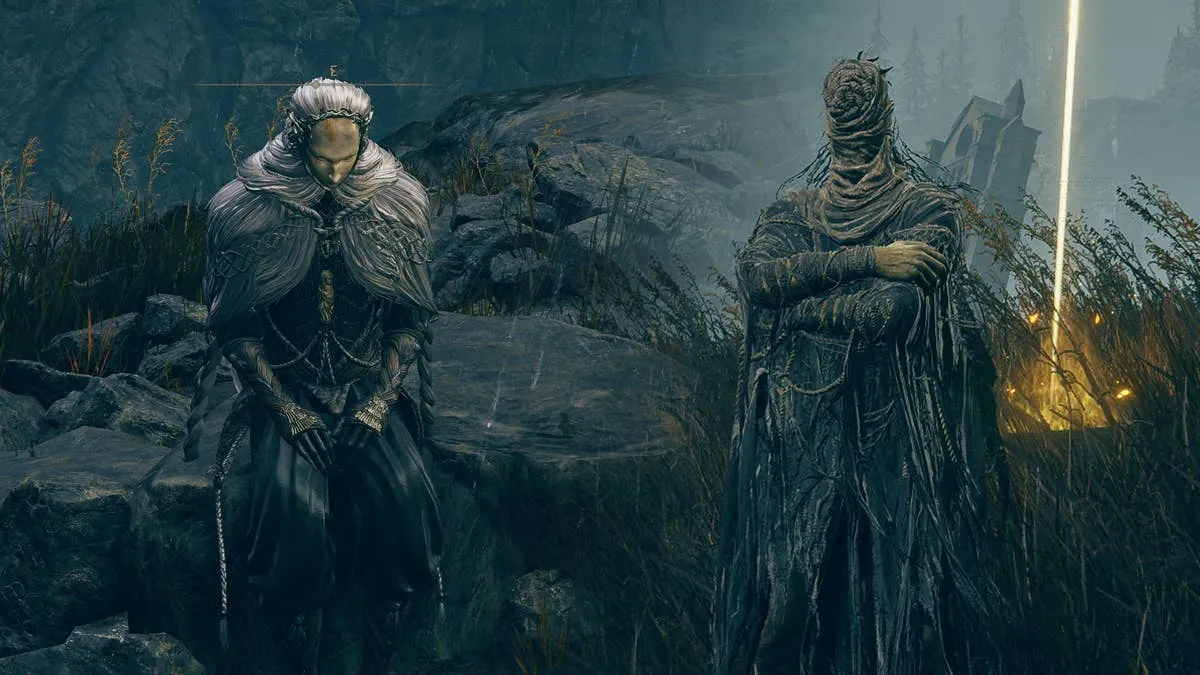
The result of this is a narrative that feels so much more vibrant than previous From games. The tale of Miquella isn't just one that you hear about in retrospect; it's literally still happening, your friends are basically in on it, and you can decide the outcome! This is true of base Elden Ring to a certain extent, but with so much of that game situated in the ways that the past laid the groundwork for the present, Shadow of the Erdtree feels like a game deeply interested in the future, and it wants you to be a part of that change. This results in learning a lot about characters who come from all over the Lands Between, brought together by their shared faith in Miquella’s grand designs.
(This section contains spoilers for Elden Ring: Shadow of the Erdtree. If you haven't played it yet, go do that, idiot!)
Miquella himself is a deeply interesting character, touted in the base game as a kind and gentle soul, and revealed in Shadow of the Erdtree to be one just as trapped in the Greater Will as everyone else. It's a deeply tragic set of circumstances, as is to be expected for a From game, but he brings a unique philosophy to the overarching narrative of Elden Ring. He's a man who wants to create a better world, but cannot see a way to achieve it that doesn't require him to follow in the exact same footsteps as Marika, a path which will surely doom him to the exact same fate. His penchant for using what is essentially hypnosis to sway his followers to his side doesn't give him a lot of good guy points either.
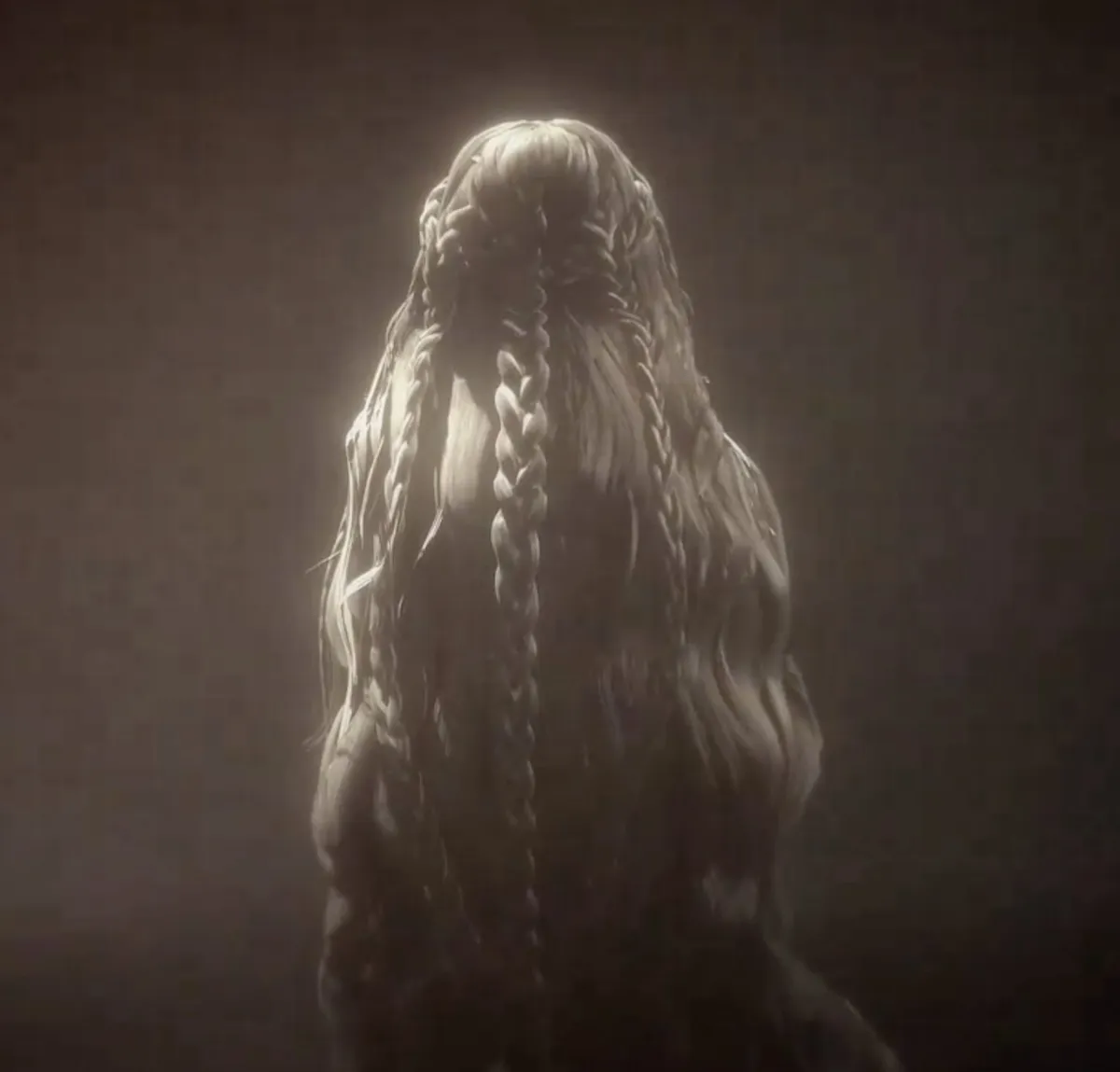
By the end of the DLC, I felt emboldened to stop him before he reached godhood. I understood that a Lands Between ruled by Miquella would simply suffer the same fate as the one ruled over by Marika. I made my way up the shadowy palace in the sky and I found myself face to face with all the characters I'd met on my journey, some of whom I had considered friends. They were good folk - honest and brave, and true to their beliefs - but we were on opposing sides. It was either us or them. We must be united in common cause.
I've felt a lot of things while playing From Software games - loneliness, frustration, euphoria, quiet desolation, and so much more - but I've never felt what I did facing off against the followers of Miquella. They were all trapped in their unflinching beliefs, and they paid the price for it, but for the first time in any of these games, I felt like there might have been another path for them; maybe I could have done more to save them. Their lives didn't have to end here, but this cruel world made that decision for them. It's genuinely devastating, and more than ever, I felt a burning rage in my heart at an Order who would cast these human beings into the afterlife for nothing. No matter what, the Golden Order needed to end, and Miquella was not the way out.
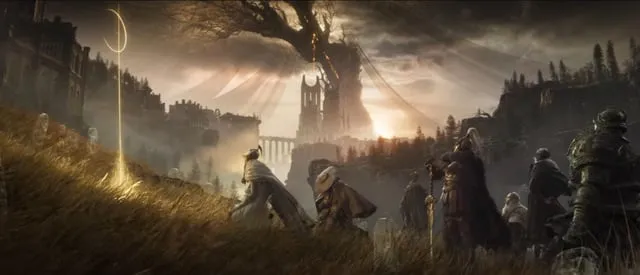
Man, I really talked a lot there, huh? I guess Shadow of the Erdtree left more of an impression on me than I realised. It's pretty amazing, like I said, and I would highly recommend it to pretty much anyone, provided they have the patience for a potentially triple digit playthrough of the base game. I think it's worth the investment, however, because no other developer is doing it like From Software. Bring on Nightreign!!
Mouthwashing
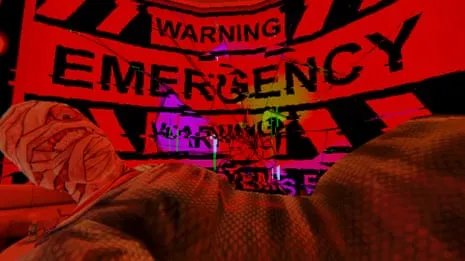
In video games, you are the hero! Most of the time, at least. If not, you're usually some flavour of person who goes down the path of evil paved with good intentions. I think this is a consequence of most game protagonists acting as a surrogate for the player, and we, as human beings, don't like to do bad or cruel things given the choice. This is why games that take that choice away and force the player to participate in morally reprehensible acts, like The Last Of Us Part 2 or Spec Ops: The Line, are so often maligned; being a part of wrongdoing against our will is a deeply uncomfortable, and sometimes even sickening, feeling.
That's what makes Mouthwashing so unique. It plays this trick by having the player inherit control of Jimmy, the acting captain of a spaceship delivering cargo, which crashes into an asteroid and renders the prior captain, Curly, horrifically injured and bedridden. Jimmy is tasked with overseeing the continued survival of the crew, who are now all stranded in the outer reaches of space with little hope of rescue. You get the sense early on that Jimmy is kind of an asshole, in the way he berates the ship's nurse Anya, but I initially chalked this up to a case of stress overwhelming him. Even still, the vibe was off.
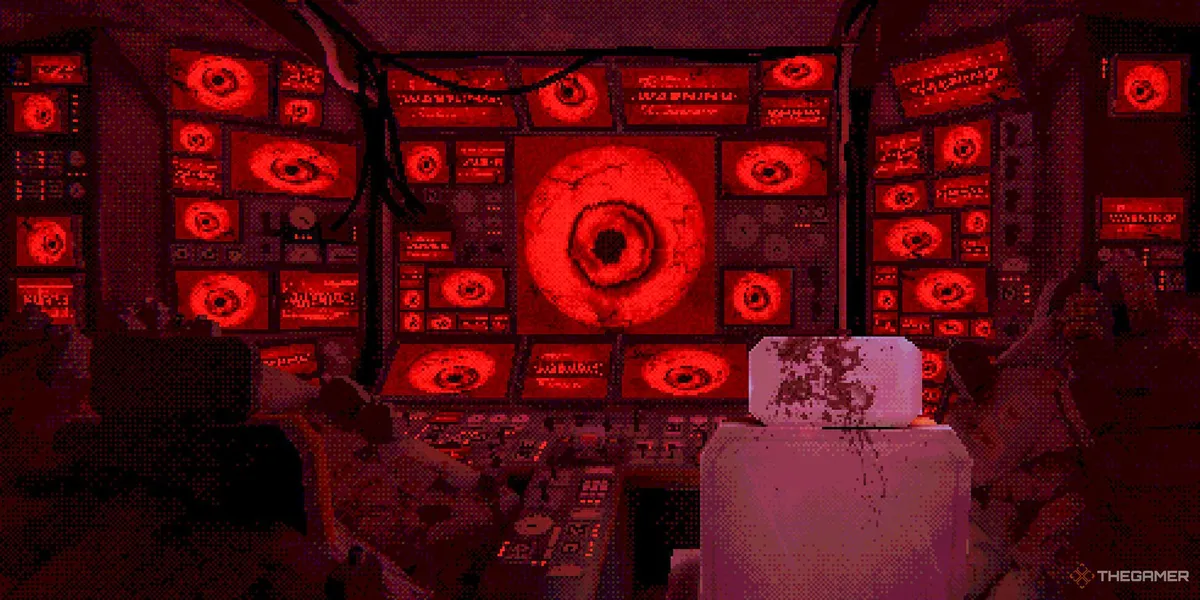
The game is very cleverly structured non-linearly, opening on the ship crashing and jumping back and forth in time from there, drip feeding little pieces of context that explain, slowly but surely, why Curly decided to crash the ship. Oh, by the way, he did that! What the fuck!! The game does some cool things with testing the boundaries between the real and the imagined. One moment you'll be walking towards the cockpit, only for the door to open into a cavernous void you can't escape from. In motion, it feels like a nightmare made manifest; as if the game itself is set within a tortured mind, forced to relive the same horrific events over and over again. As the narrative unfolds and you start to realise not just what happened but why, a sense of dread begins to seep its way into your soul. The answers we seek are complicated, and not particularly satisfying to uncover, but find them we must.
Mouthwashing is, first and foremost, a game about responsibility. It isn't particularly subtle about that fact, literally blasting the words “TAKE RESPONSIBILITY” directly into your corneas more than once. Naturally, playing as the captain of a ship, the responsibility theme is self-evident, but the meaning of the word is more liquid than that. It's about taking responsibility for the self. The game has no intention of preaching to its audience; it simply posits: what if the captain in charge of a crew was completely incapable of self-reflection? A difficult concept to grasp for anyone who has ever had a shitty boss, I know. It goes deeper though. What if that boss wants more than anything in the world to be redeemed, to be seen as a good person and deserving of his position, and will go to any and all self-destructive lengths to prove that?
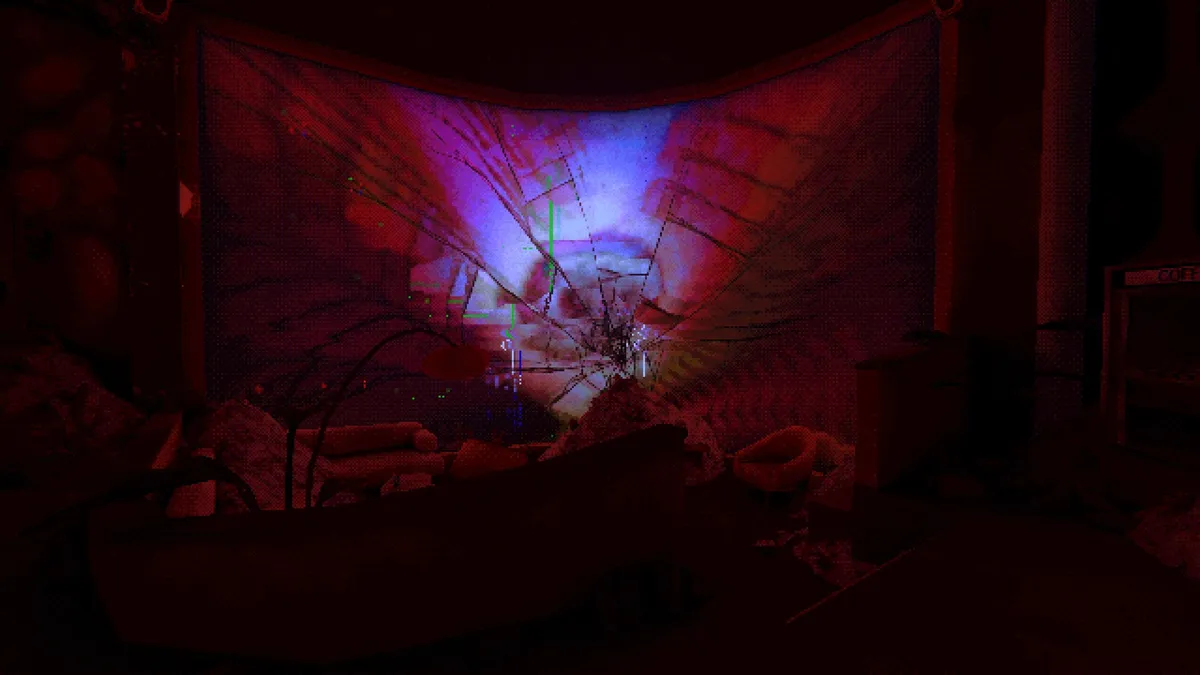
I'm so used to games that seek to redeem their morally complex characters. I played the Silent Hill 2 remake not long after this, and that game goes to great lengths to portray its protagonist James Sunderland as sympathetically as can be reasonably expected for one who [REDACTED]. Don't get me wrong, Silent Hill 2 is incredible, and a landmark title for mental illness representation in fiction, but Mouthwashing comes at the concept of a character committing an unforgivable sin with a decidedly unforgiving perspective, and in a way, that's kind of an electric experience.
Have you ever seen those police interrogation true crime videos? JCS is the main channel covering them, but there's loads of other examples. These videos are interesting in the ways we get to see some of society's most horrible people react to being trapped, try to justify their actions, and the catharsis of watching them slip up or make mistakes. Of course, the morality of police interrogation tactics will always be questionable, as a lot of confessions they get are declared under duress, but I'm talking here about the ones who undoubtedly did a terrible act and are proven to have done so. What always fascinates me - as I'm sure it does many others - is why the suspects ever bother to talk to police in the first place. Presumably, everyone knows they can say nothing and call upon a lawyer to represent them, a request the police are then obligated to honour. Indeed, this is the soundest strategy in terms of survival, even if you didn't do the crime, since the cops will quite happily still pin on you on it by twisting your words to suit their narrative.
Time and again, however, criminals will insist on complying, answering questions and digging themselves into deeper and increasingly inescapable holes. It's insane. Why do this? You don't owe these guys anything, and surely you must know that saying more will only make your situation worse? However, I think the reason lies in the fact that human beings are social animals, and we naturally desire to be liked and accepted by the people around us. We'll go to great lengths to have our actions approved by the collective, even if that means admitting to committing horrendous acts. Humans don't want to be good necessarily, but rather to be perceived as good, even if that means dragging everybody else down with them to achieve that end.
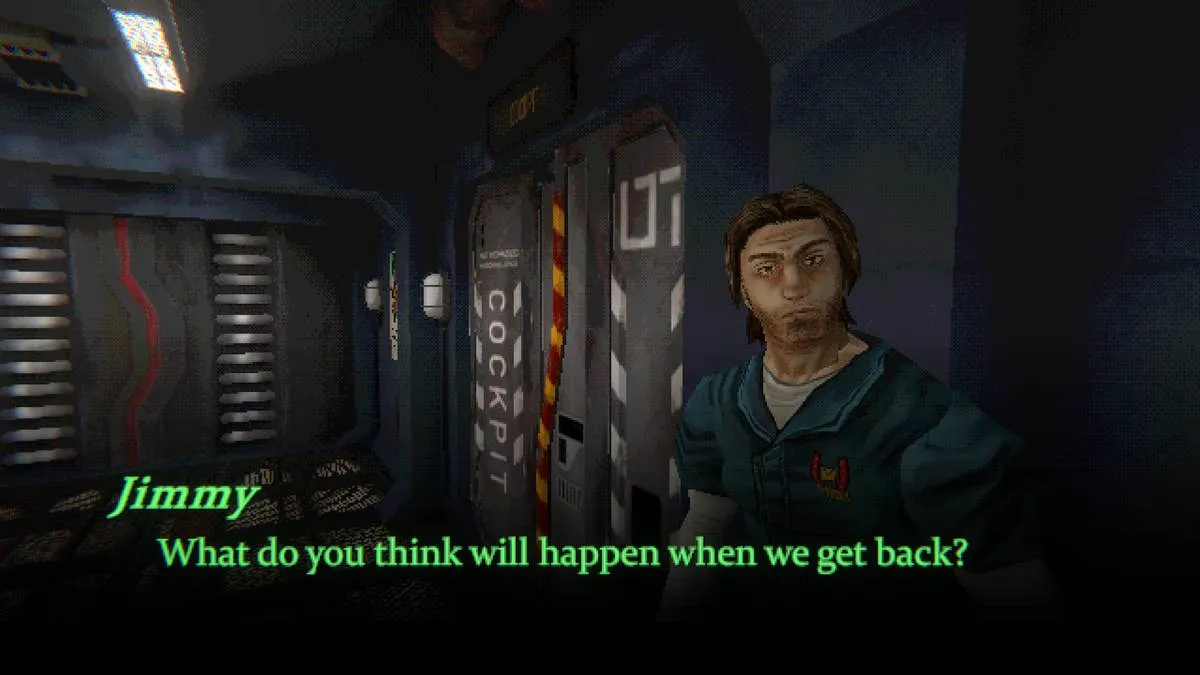
That's what Mouthwashing is about: that insatiable desire for social acceptance, even when one's actions are unacceptable, and the self-destruction that follows when trying to reach that. It's a sobering reality of the lived experience, and one we could all do with being reminded of.
Neva
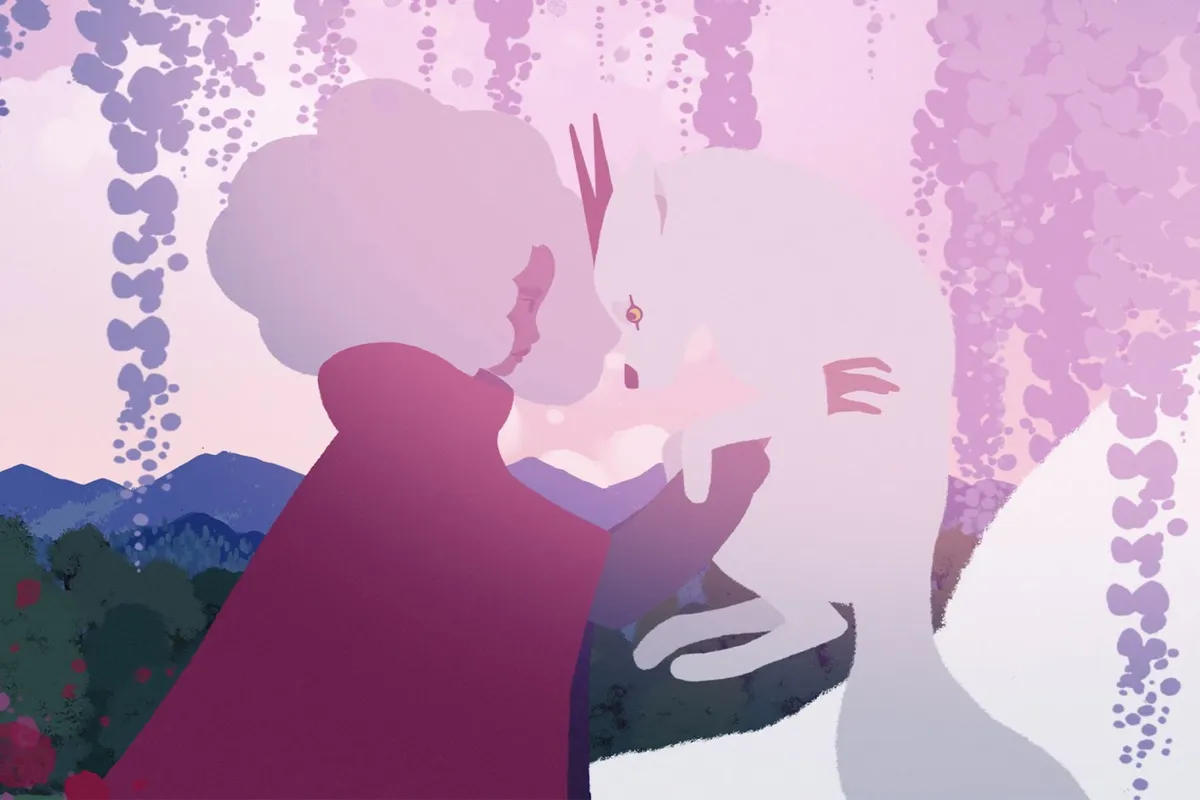
I think Neva was always going to be a game that I liked. First and foremost, it's a game from Nomada Studio, the people behind 2018’s Gris, which I enjoyed quite a bit and, over the years, has only aged better in my mind. There's also the fact that it's a game about the relationship between a girl and her dog, which is such an easy gimme. Like, come on! Anything coming even remotely close to evoking the feelings I got playing The Last Guardian is automatically a winner in my book. In my last post, I talked about developing a spiritual bond with a car while playing Pacific Drive, if you needed a reminder of the insanity levels I'm operating at.
Of course, whenever you have a story about raising an animal companion, the obvious predictions will start to fly: either the human dies, or the dog dies, and it'll take a very special kind of game to pull off anything other than that. Indeed, the game opens on the death of a companion, but not necessarily the companion. A mother wolf dies in a fight against a formless shadow enemy, leaving the girl and her very young pup to face the world alone. It's a slightly different framing device and the game utilises it to sow doubt in the player's mind. Maybe the dog…won't die? I mean, two dead dogs is kinda overkill, right?
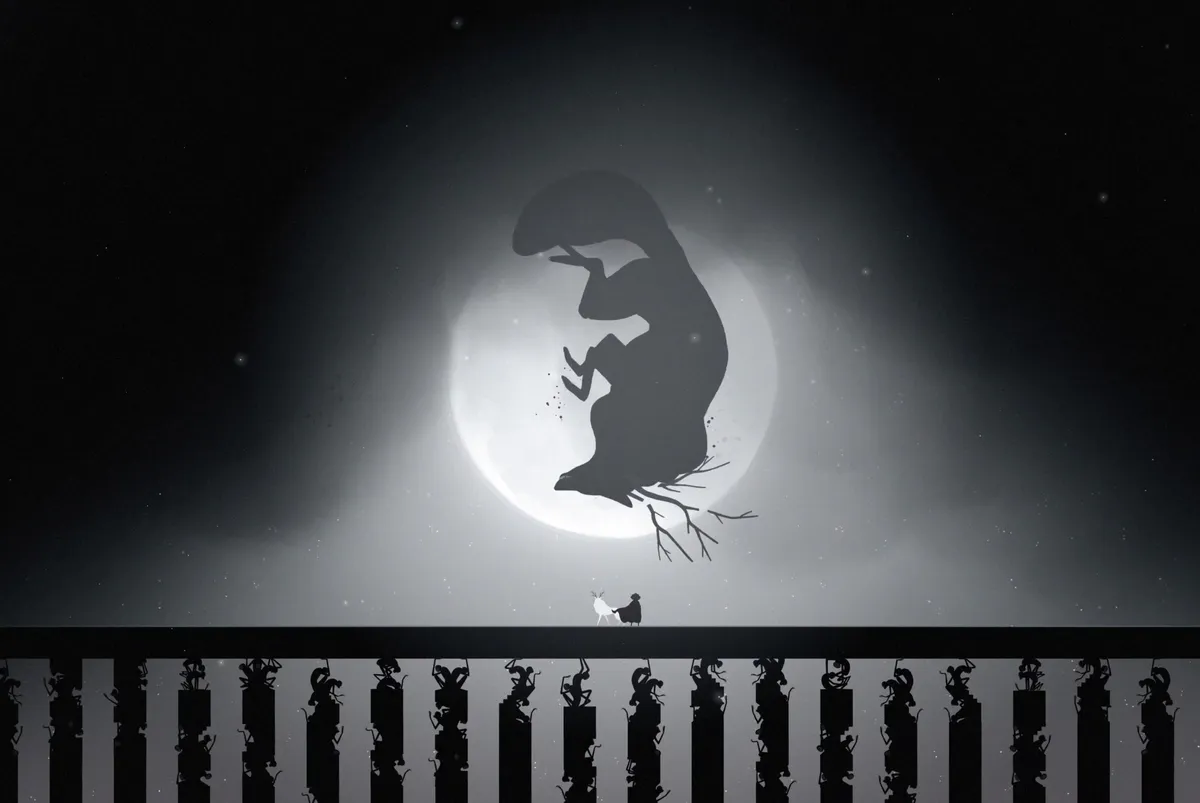
Not that it particularly matters early on, because from that point you set off on an adventure to free the wilds of this malicious darkness. Neva’s inspirations are pretty evident from the jump. Studio Ghibli’s works, like Princess Mononoke and Spirited Away spring to mind, primarily in aesthetics but also in vibes. Depicting the beauty of the natural world, oftentimes with a fantastical twist, has always been a large part of Hayao Miyazaki's works, and Neva leans into that aspect heavily by being one of the most breathtakingly gorgeous games I have ever seen, heard, or played. From Berlinist's beautiful soundtrack to the painterly detail in every environment and background, Neva astounds. Even the character animations are fluid in ways that means it also feels beautiful to play. Navigating these picturesque landscapes never once got boring or tedious, simply because the game's aesthetic brilliance never allowed it to.
Despite all this, initially I couldn't help but feel a little cold on Neva. I went into it with certain expectations - that the relationship between the girl and the wolf would develop over time, and that would manifest in its gameplay - and that was certainly met. Neva (the wolf is called Neva, I should've said that sooner) starts off easily distracted and often vulnerable, unable to participate in fights, resulting in my needing to keep an eye on her in the midst of battle. Eventually, she grows - both physically and in confidence - and she becomes a crucial asset in combat, providing a ranged attack option. By the end of the game, she's enormous, tall enough to serve as the player's mount, making traversal much quicker.
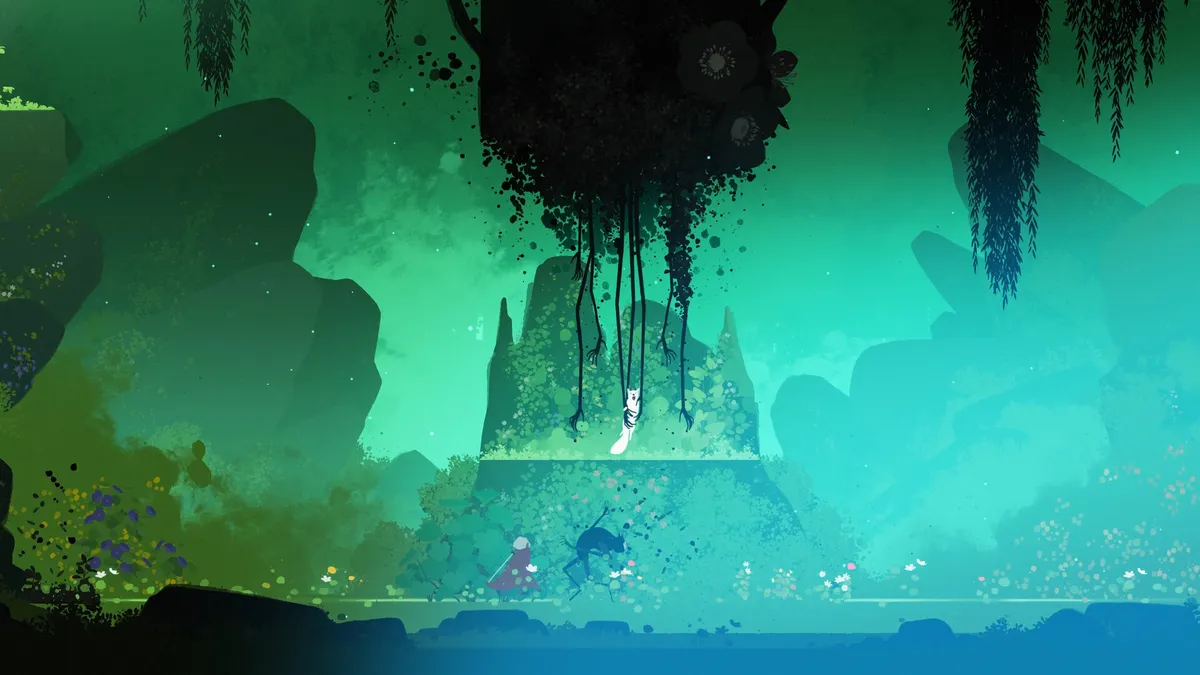
All of this is good and effectively demonstrates the blossoming codependency a story like this ought to possess, and yet I couldn't help but feel a little…predictable. I was getting precisely what I expected, and that's it, and I couldn't help but be a little disappointed by that. Ultimately, I always have expectations for games, but I always secretly want those to be surpassed, or at least subverted. For a while, Neva seemed to be settling for what works, and for all the game's unbelievable glitz and glam, it came across as somewhat shallow.
Nevertheless, I persevered. The story continued, and it seemed to hit narrative beats with little buildup. I won't say what they are for fear of spoilers, but they were the kind of events that occur in stories like this all the time, and I remember thinking “oh, makes sense that would happen, yeah” and then we'd just move along. Don't get me wrong, I never stopped enjoying Neva, but it wasn't wowing me like I'd hoped. Then the ending comes around and I find myself experiencing a whole new cocktail of emotions. It's a twist ending of sorts, but not in the traditional sense. Its power lies less in the actual events that occur, but rather the execution: the pacing, music, and visuals all coalesce to craft something that seems rote on paper, but experientially it is absolutely astonishing.
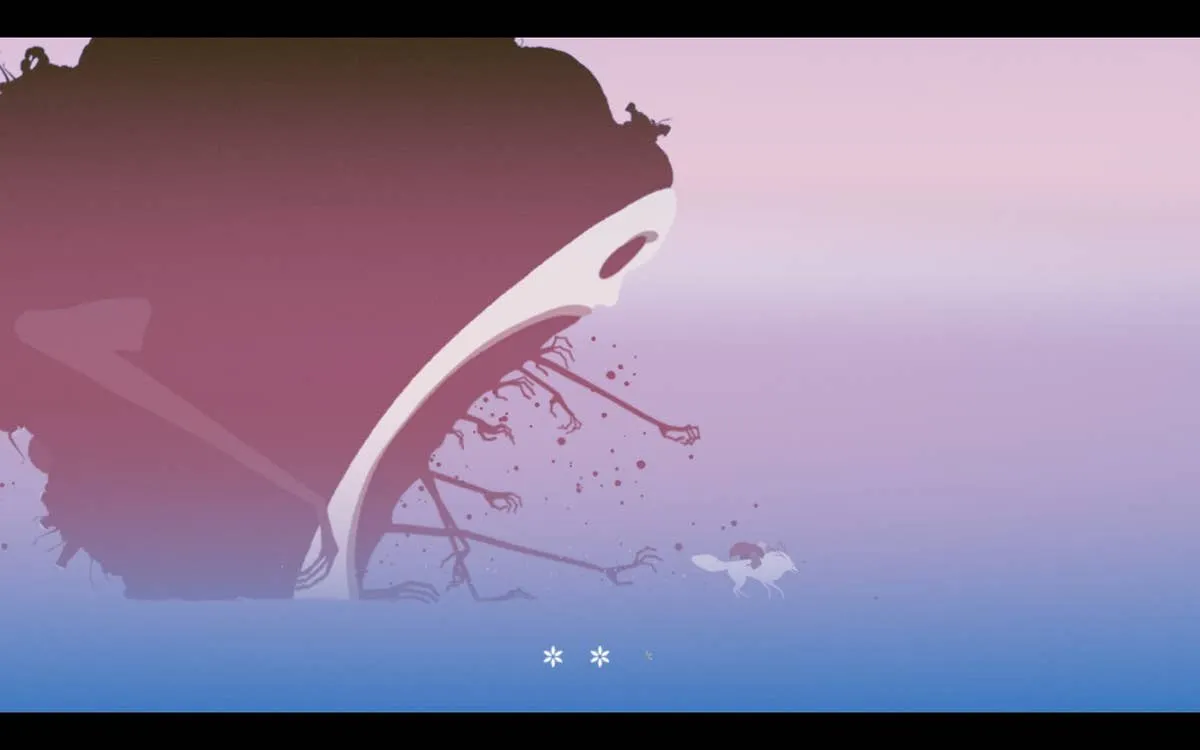
Apologies for the vagueness; I realise that my initial description of this game probably doesn't sound particularly appetising. I think what I appreciate most about Neva is that it did end up surprising me, and that alone felt valuable, like the rest of the adventure was made worthwhile in that single moment. It's not even a matter of destination over journey, though. It's this magical, rare situation where the destination makes the journey feel so much richer in hindsight. It's the kind of moment that makes me want to play it all over again, with a new appreciation of the entire experience.
I wouldn't blame someone for getting halfway through Neva and declaring it to be generic and stopping, but if you are that person, or someone who is apprehensive about playing it for similar reasons, I'm here begging you to give it another look. It achieves something with its ending that very few works of fiction ever manage, and maybe someday, I'll explain why. For now though, I can only say: PLAY NEVA.
Senua's Saga: Hellblade 2
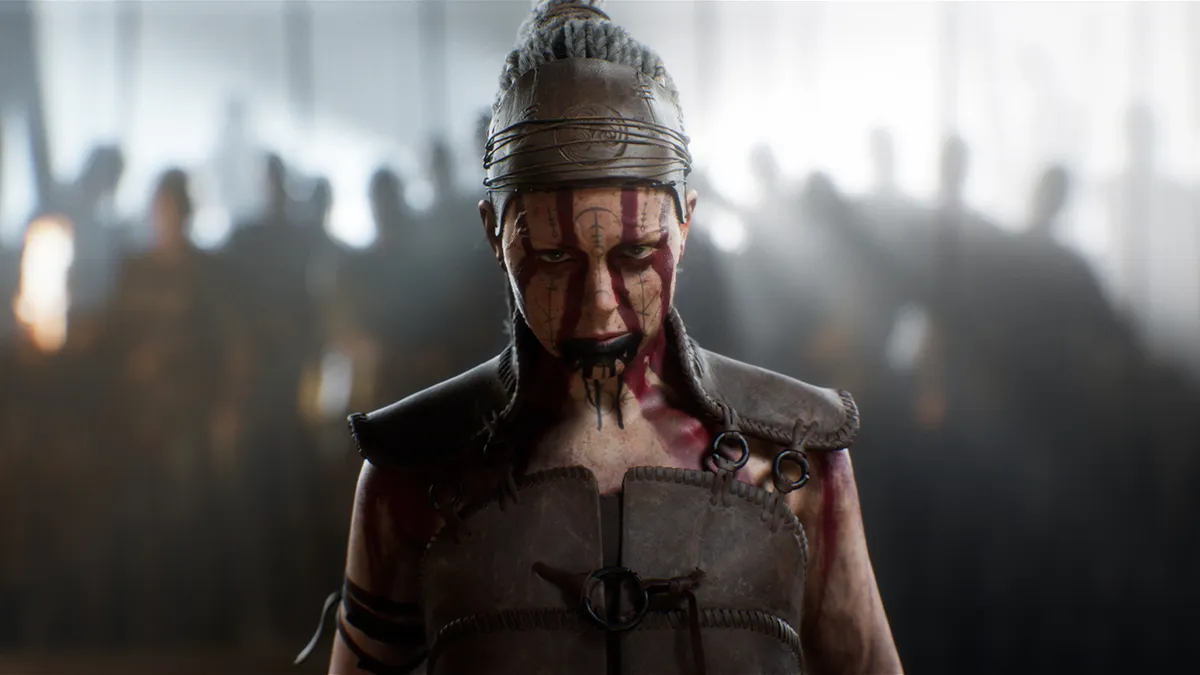
Between this and Neva, 2024 feels kinda of like the year of false starts. Admittedly, however, Hellblade 2 stands out by being absolutely astonishing to look at, and, of course, listen to. Having played the first game, Senua's Sacrifice, shortly before this one, I have to admit that I wasn't sure where you could conceivably go after a tale as finely wrapped as Senua’s. Of course, there is a level of ambiguity to the original’s conclusion, but it ends on such an emotionally satisfying note that I wouldn't have been upset if we never saw Senua again. However, here we are, sequel in our hands. Now what?
Well, you get a really great video game, though it took a little while to convince me of that. The first thing you notice is the technical magnificence of the whole thing. “Realism” kinda feels like a major understatement in this case; some of the sequences here, especially the opening battle with Thorkestr, with a combination of groundbreaking face capture tech and incredible lighting, feel like straight up real life at times. It's an honest to God spectacle, and while I'm not one to get particularly excited about hyperrealism in games - I often find myself dismissing it as a fruitless endeavour that will surely only age poorly with time - the sheer craft on display in Hellblade 2 makes it feel like a genuine aesthetic choice rather than the cynical attempt to indicate prestige it so often is.
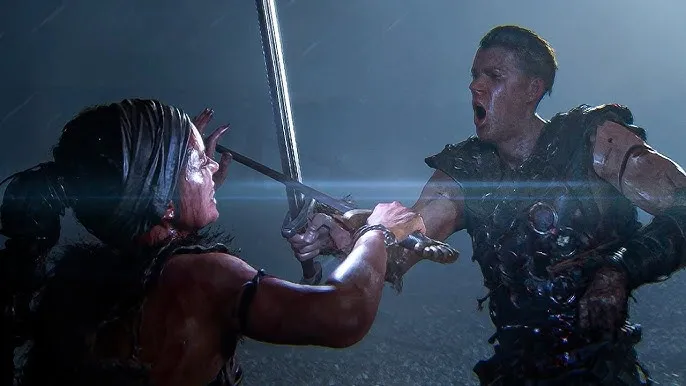
That extends to the rest of Hellblade 2’s design, for better and for worse. On the one hand, I respect the absolute commitment to the vision. Heavy film grain use, letterboxing, and basically zero HUD elements result in an experience that is undeniably cinematic. A lot of modern triple AAA games are afforded that label, but Hellblade 2 is one of the few games that truly earns it in my opinion. This extends to combat. Senua doesn't execute combos or juggle enemies like a madwoman; her sword swings are often laboured, and blocking incoming blows is met with the effortful grunt after a genuine test of strength. Unlike the first game, enemies only come at Senua one at a time, and with every foe slain, a highly detailed animation plays - bumping into an ally or narrowing dodging an off-screen stab - transitioning her into the next duel. On the one hand, the game loses some of that sense of organic desperation and powerlessness that came with being overwhelmed in Senua's Sacrifice. On the other hand, when it works, this new approach is profoundly immersive.
Senua's Saga is, in that sense, a much more carefully directed experience compared to its predecessor, and that can cause the journey to feel less personal. Nevertheless, this is still Hellblade, so Ninja Theory's execution of its concepts is thrilling to behold. Naturally, I can't continue speaking about this game without mentioning the sound design, and specifically the simulation of auditory hallucinations brought about by the protagonist's psychosis. It's such a risky thing to attempt, creatively and ethically. You're running the risk of alienating a lot of people by including it, as the experience of having a chorus of voices in your head pestering you at all times isn't what I would call fun. Then there's the possibility of this idea being executed in a way unfaithful to the real life experience or psychosis. It's already such a taboo condition, often associated with madness or ill intent, and in the wrong hands that could quite easily result in the continued miseducation of the majority who don't deal with that affiliation.
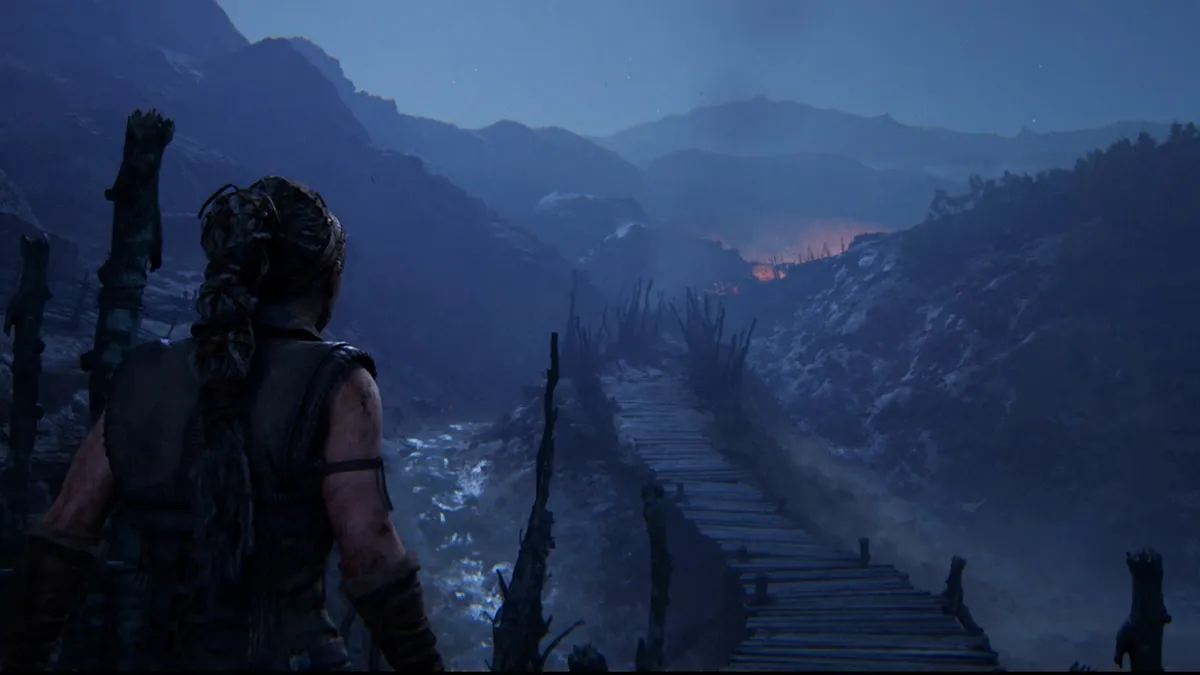
However, with Senua's Sacrifice, those fears was laid to rest for most. The execution is undeniably effective, creating an oftentimes isolating and uncomfortable experience unlike anything I've experienced before. Senua's Saga is more of that same presentational excellence, and it's additionally cool to see a game with such an obviously large budget contain such a bold creative choice. It helps that Senua's psychosis is still at the core of her internal struggle in this game as well. If the first game is about Senua learning to move on and continue living despite her loneliness, then the sequel is about strengthening that resolve, seeing her differences as strengths, and directing that energy into enacting good in the world. The way her journey impacts the people around her is also very compelling, and I like that the ending leaves on a somewhat ambiguous note, less concerned with being definitive in its internal logic than simply rounding out the emotional experience. I liked that in Senua's Sacrifice and I like it here.
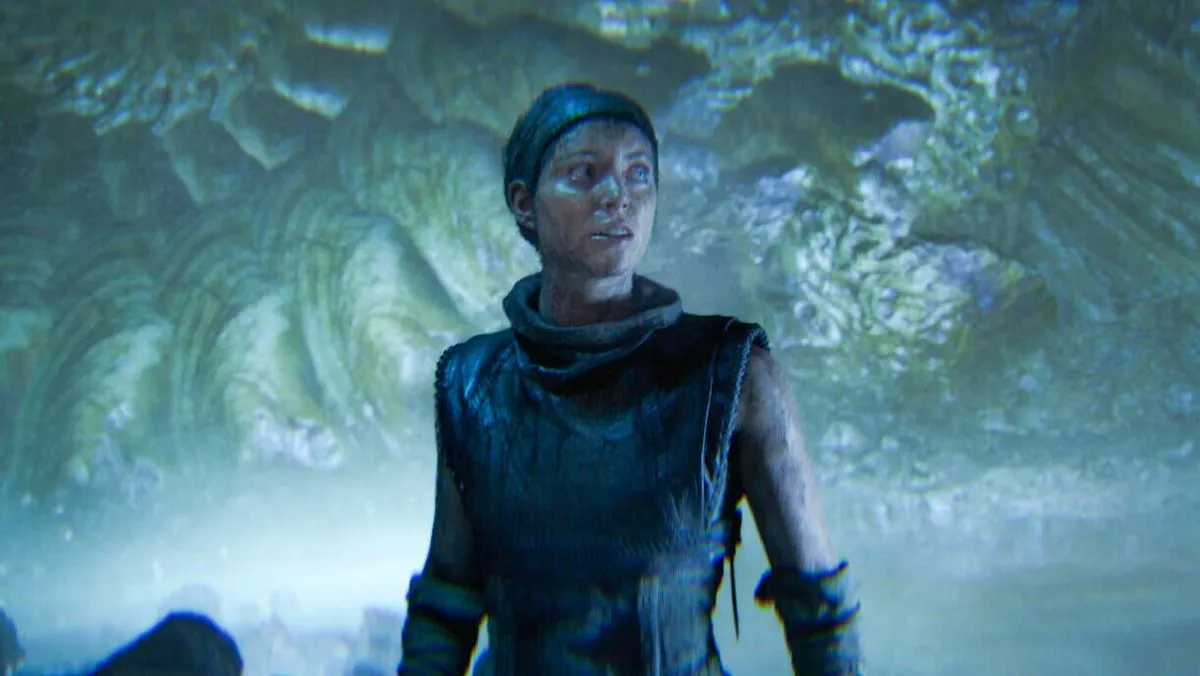
For all intents and purposes, Hellblade 2 wasn't exactly a smash hit. Sales aren't really a good indicator of this, obviously - the Game Pass format makes figures like that basically redundant - but it also didn't light quite the same fire under the gaming zeitgeist as the first did. Nevertheless, it's still a really wonderful game. I don't think I like it as much as its predecessor, but that was already such a high bar to clear, so I'm willing to make peace with that. I can't deny the impact the experience left, months later.
//
And that's it! Now the only thing left to do is round this bad boy out with my official Game Of The Year for 2024! And you'll get to find that out...next time! Hopefully that blog won't take quite as long as this one did, since I'll only be talking about one game, but I want to make it a good one so please be patient and give me time to do it justice. It is the best game of the year, after all. I owe it that much.
For now though, I'll say goodbye. I hope to see you for the thrilling end to this trilogy, and then we can get back to regularly scheduled programming, which for me is writing something if I feel like it. Exciting!!